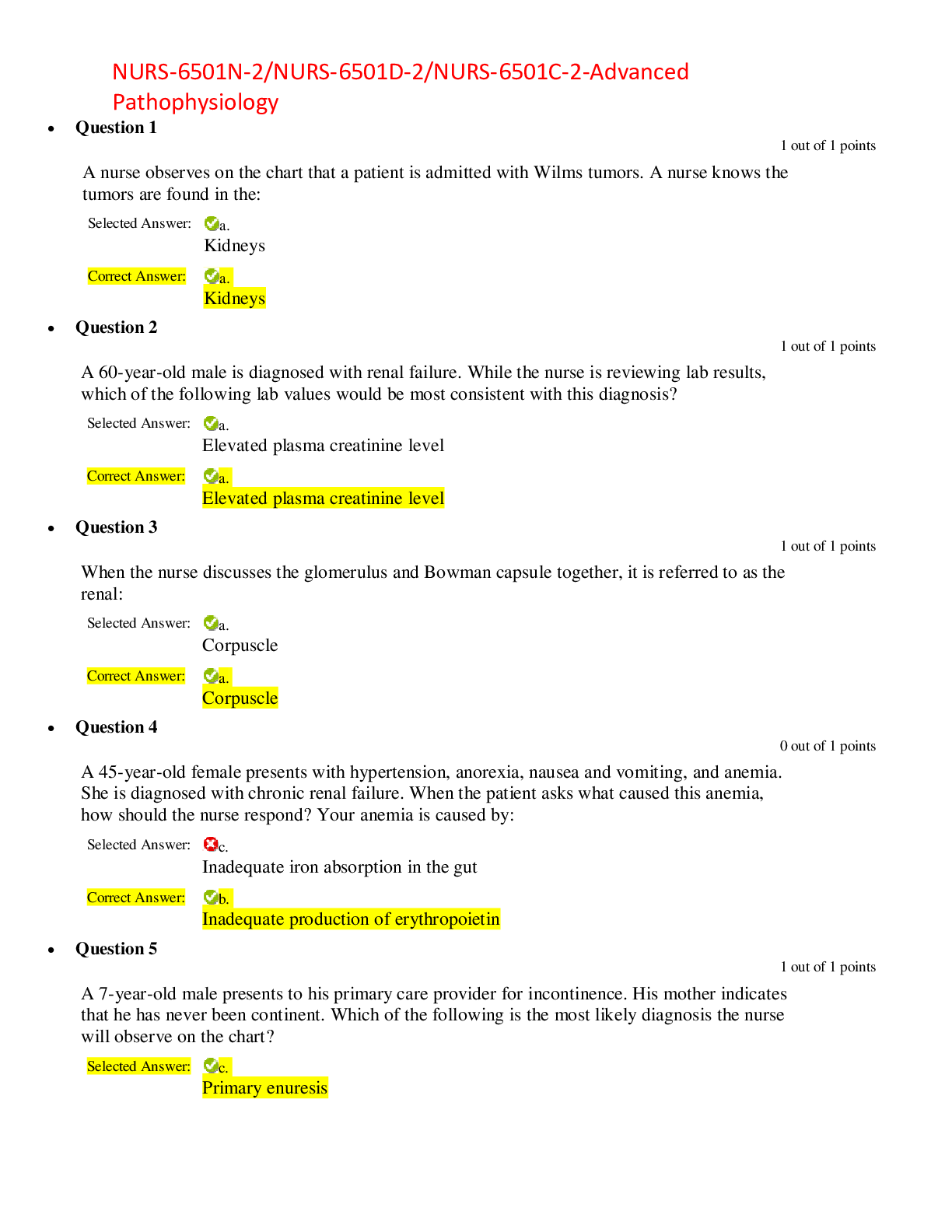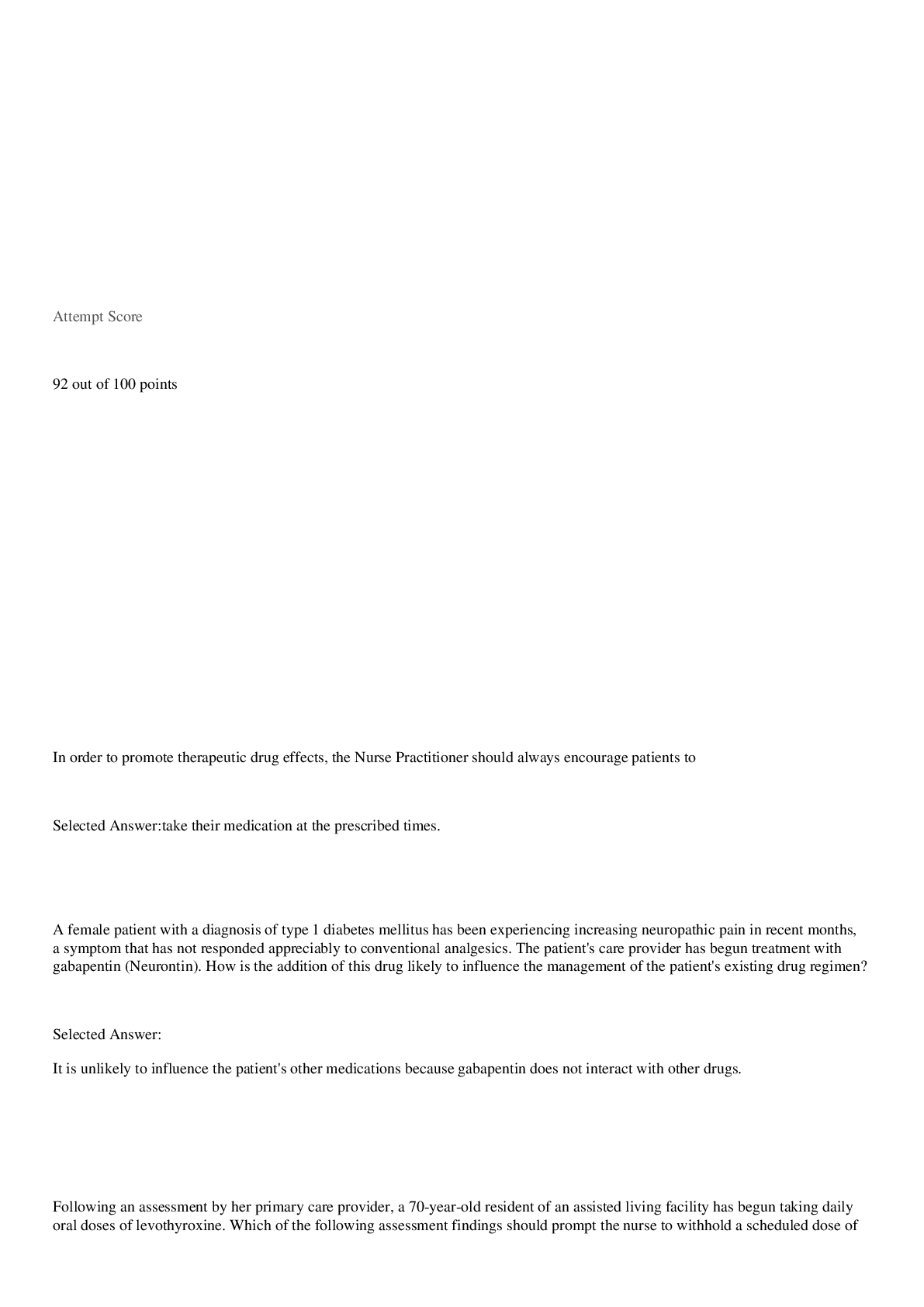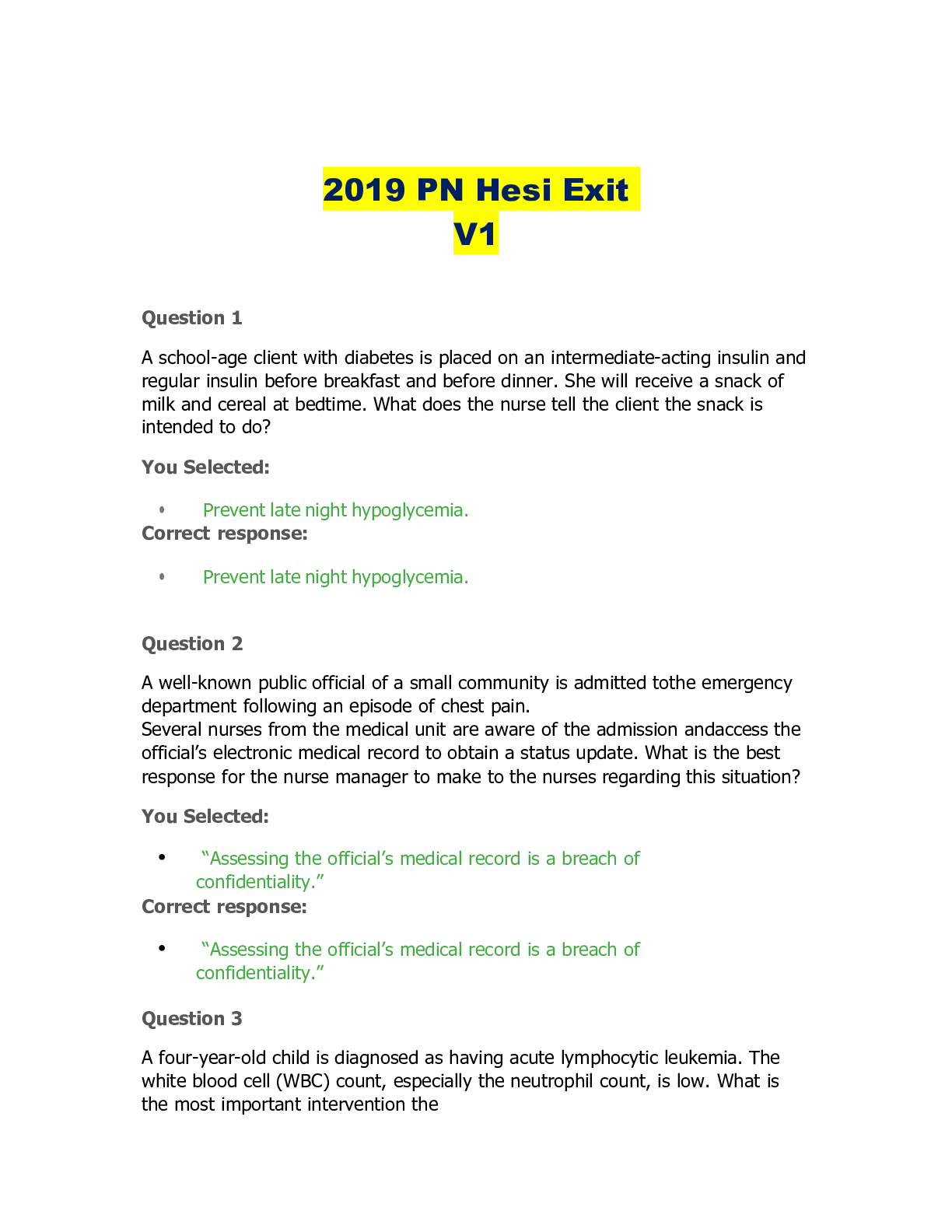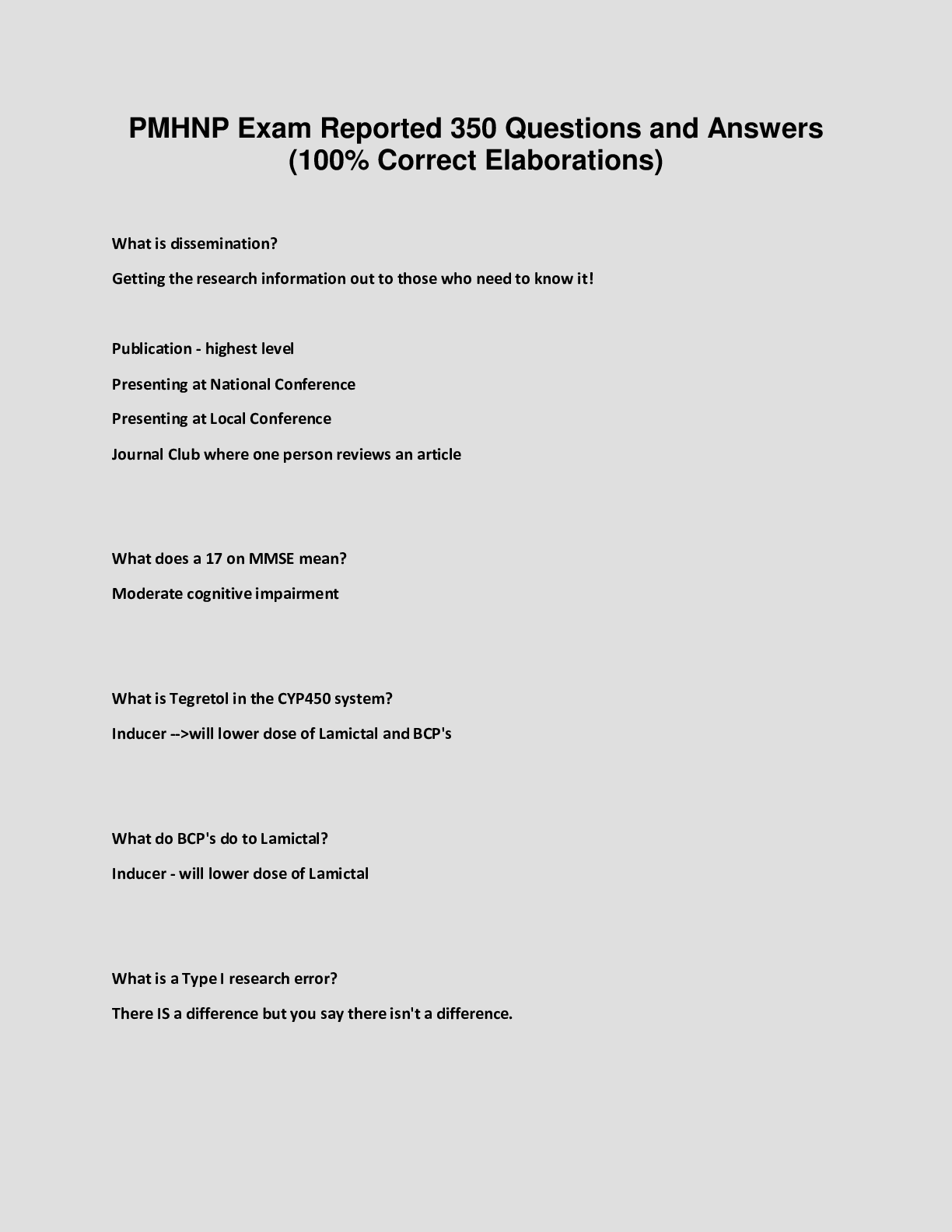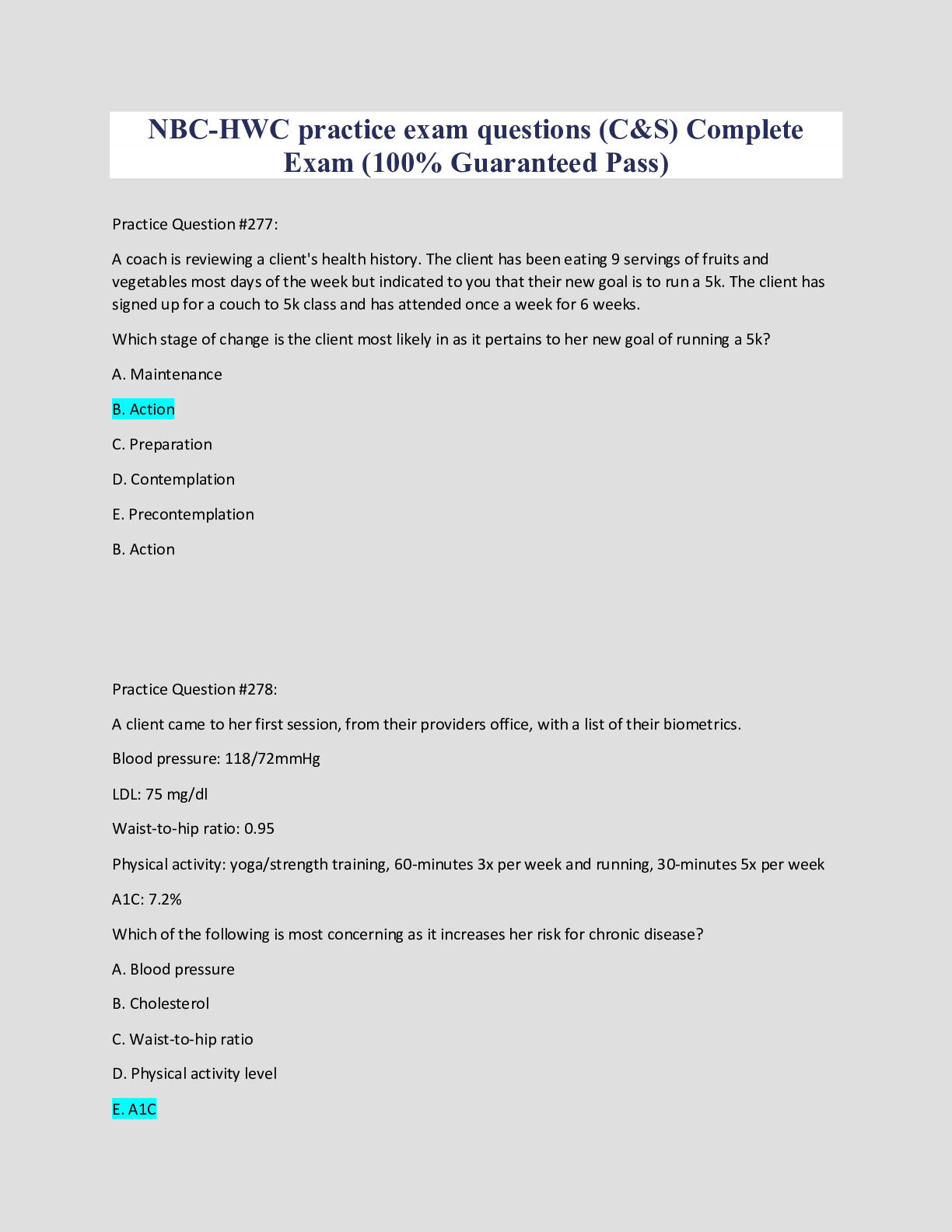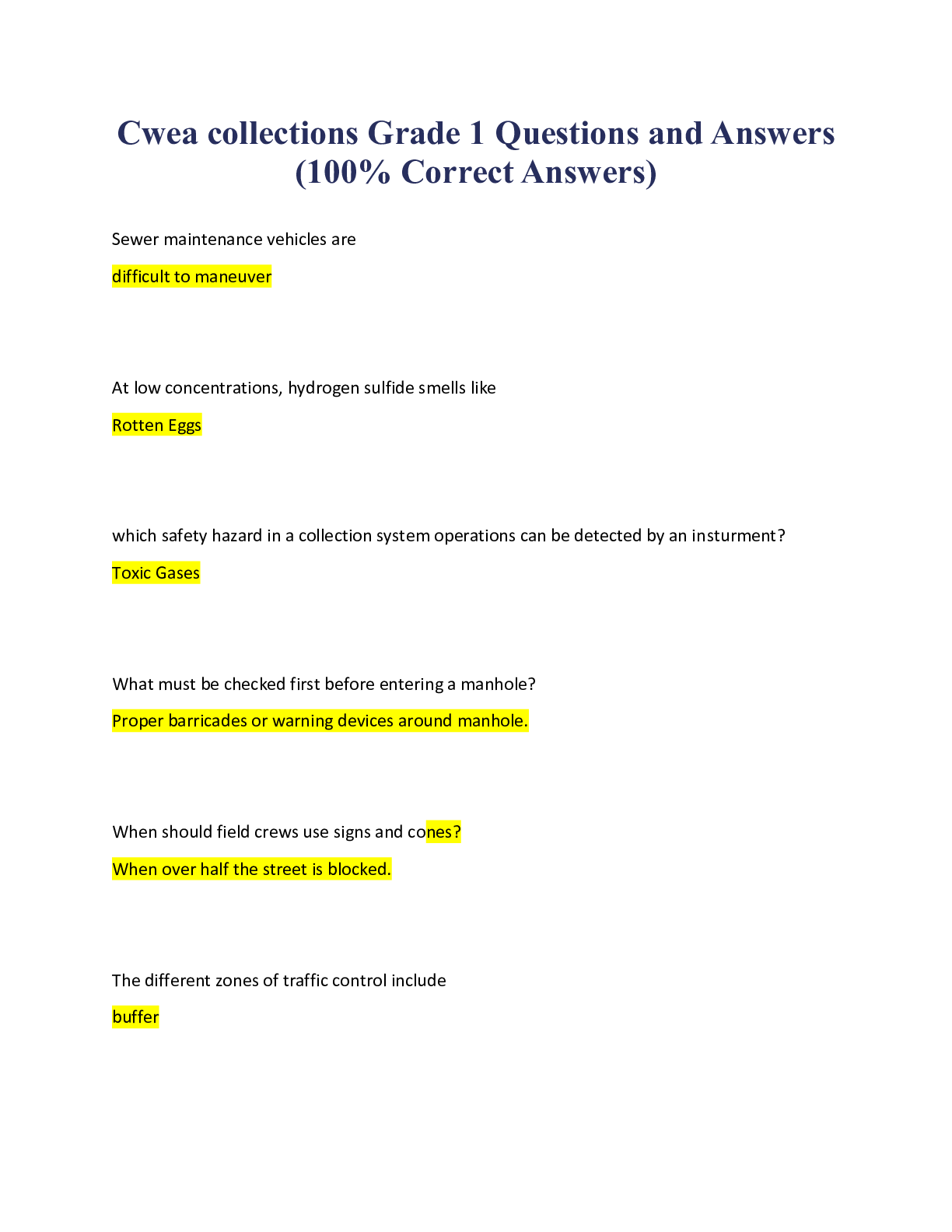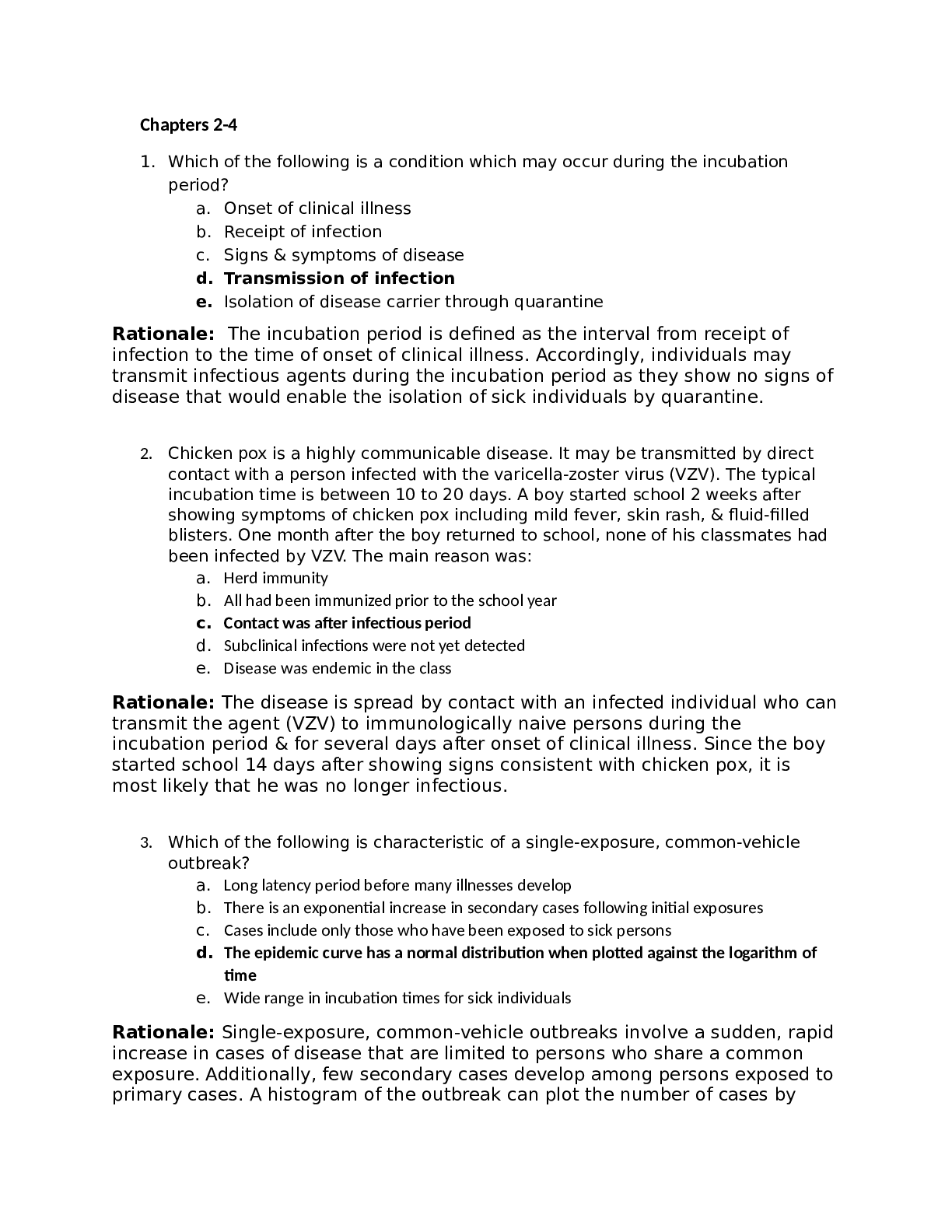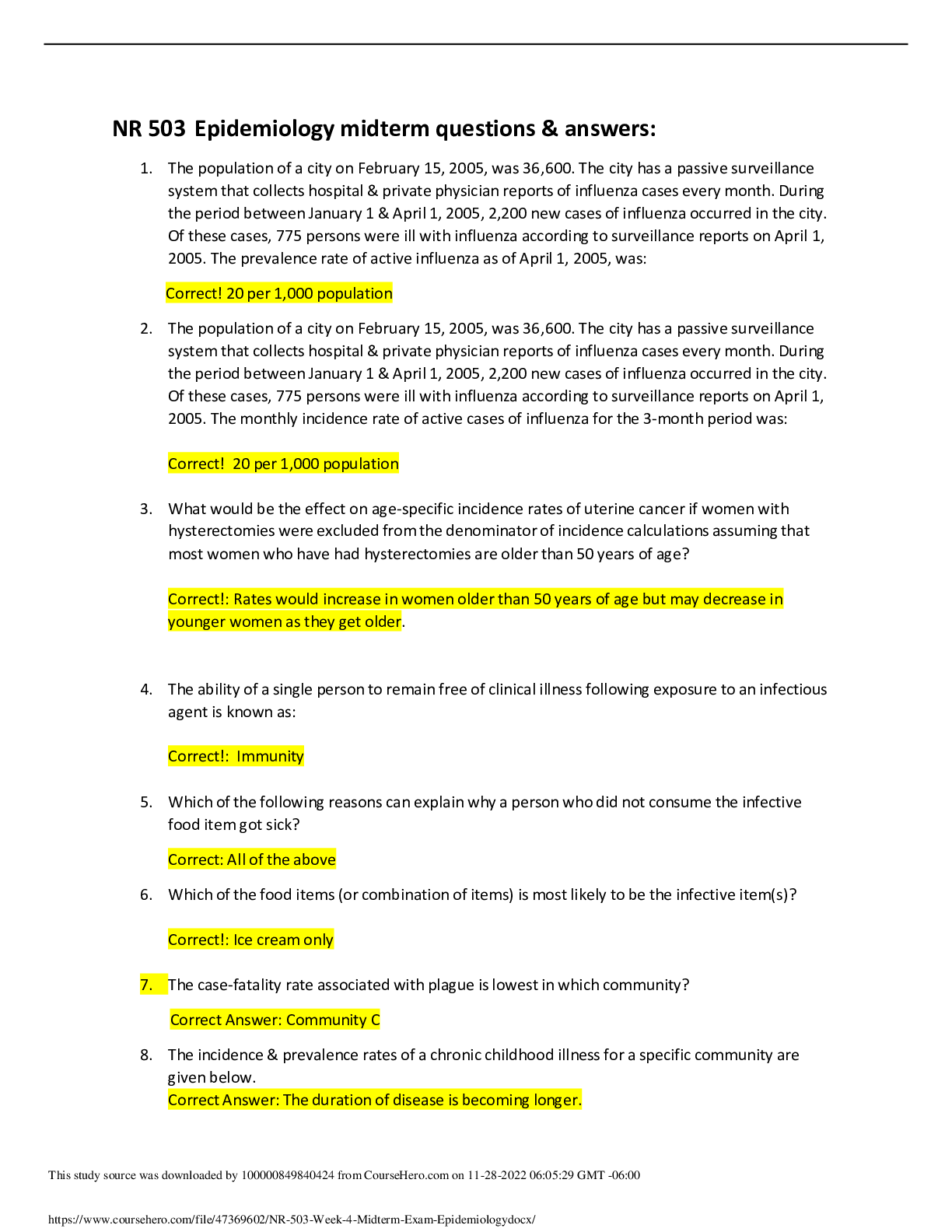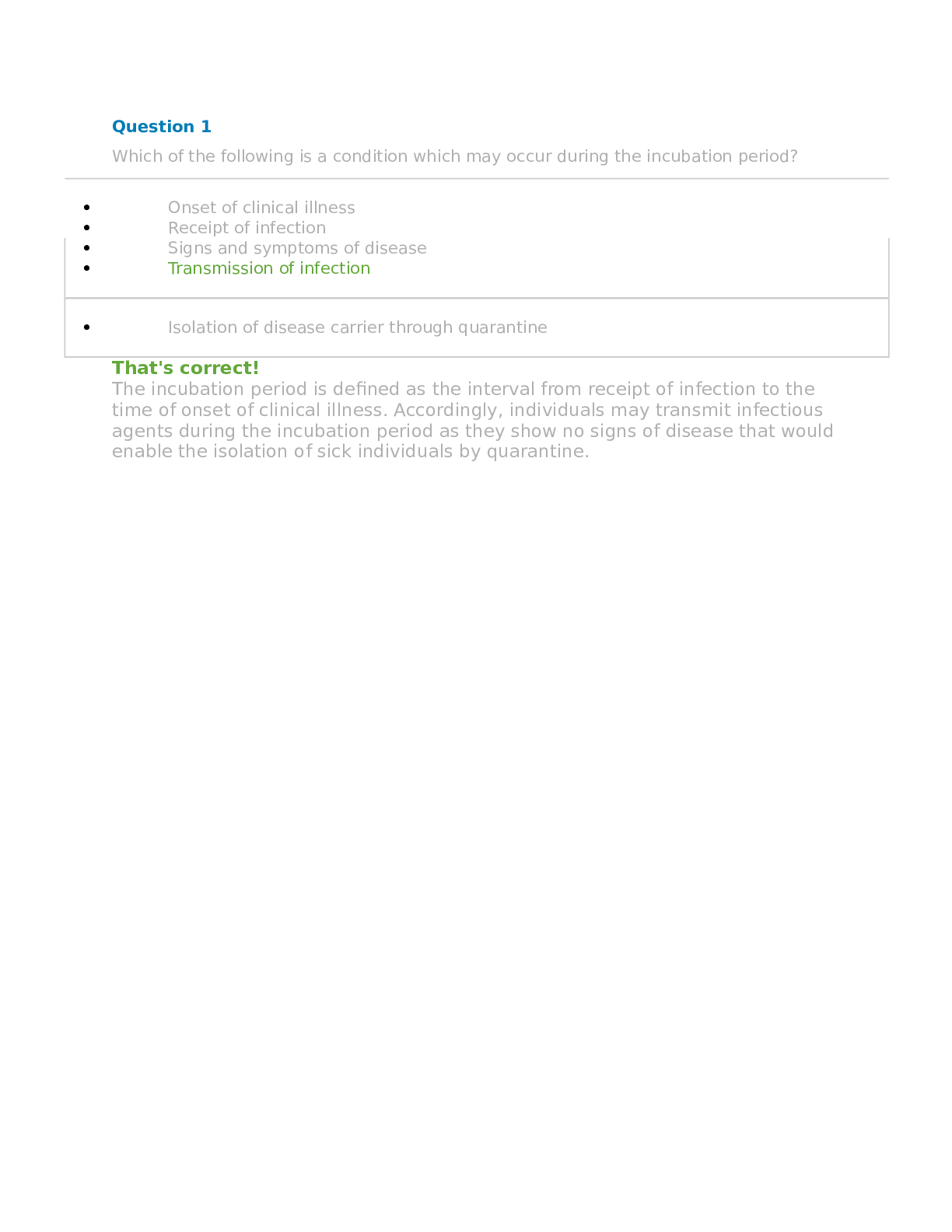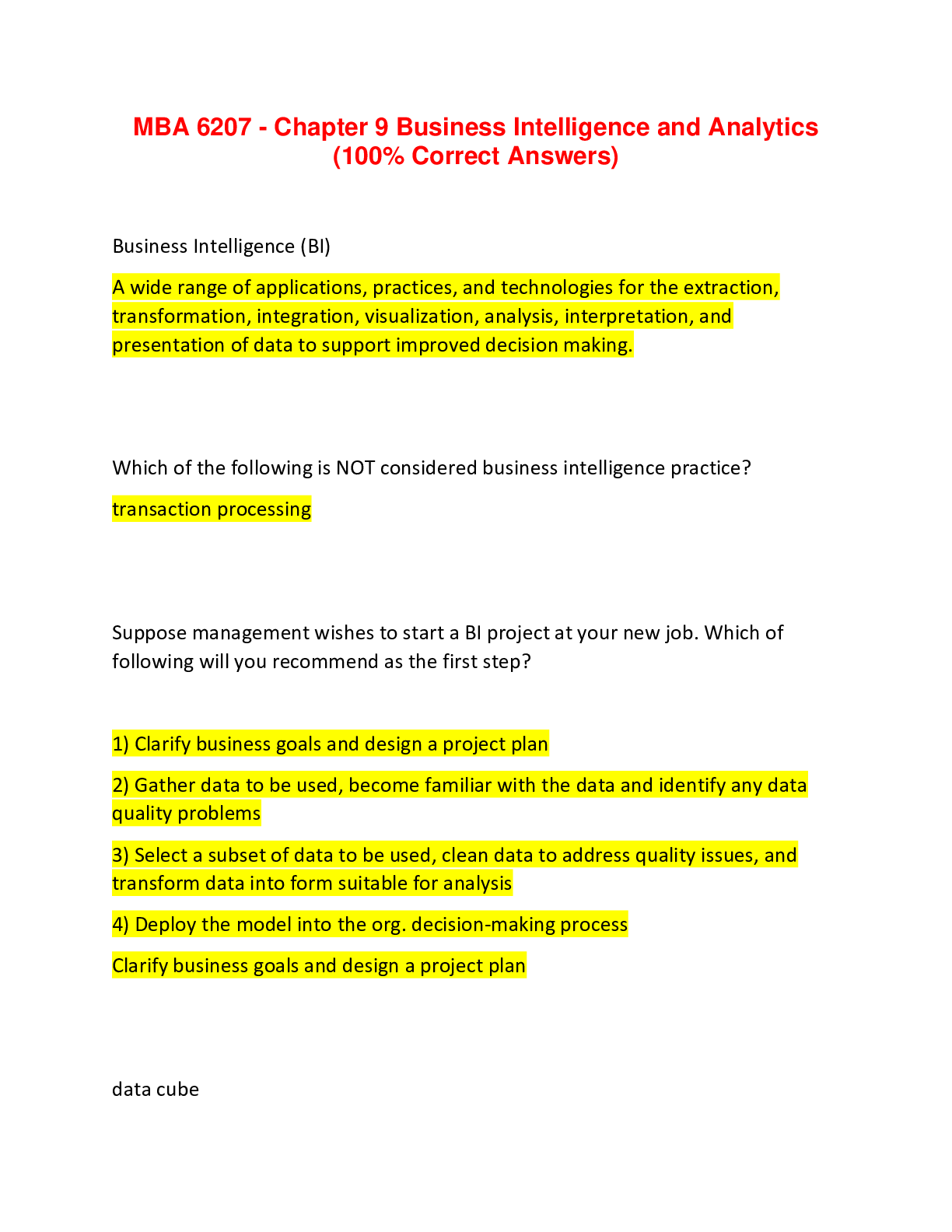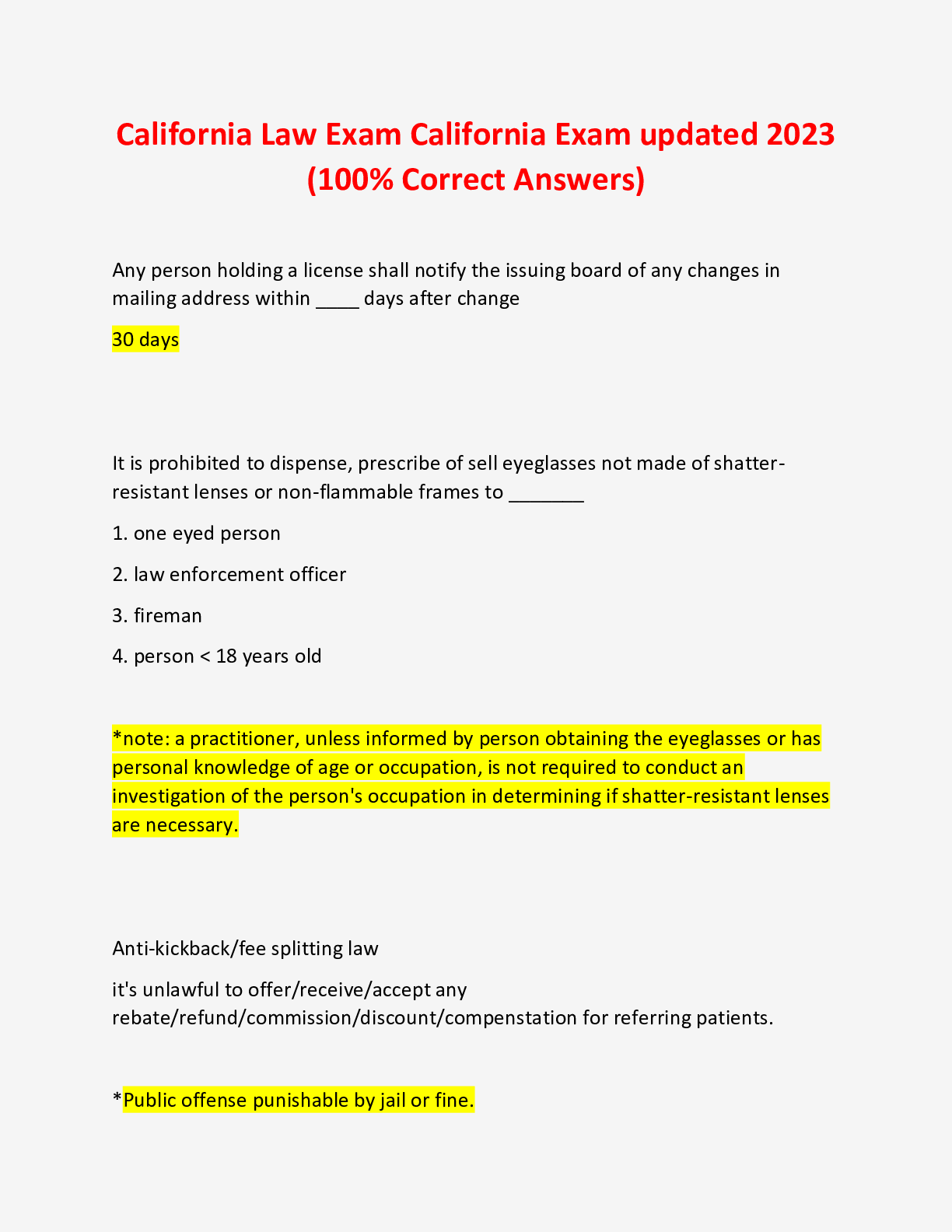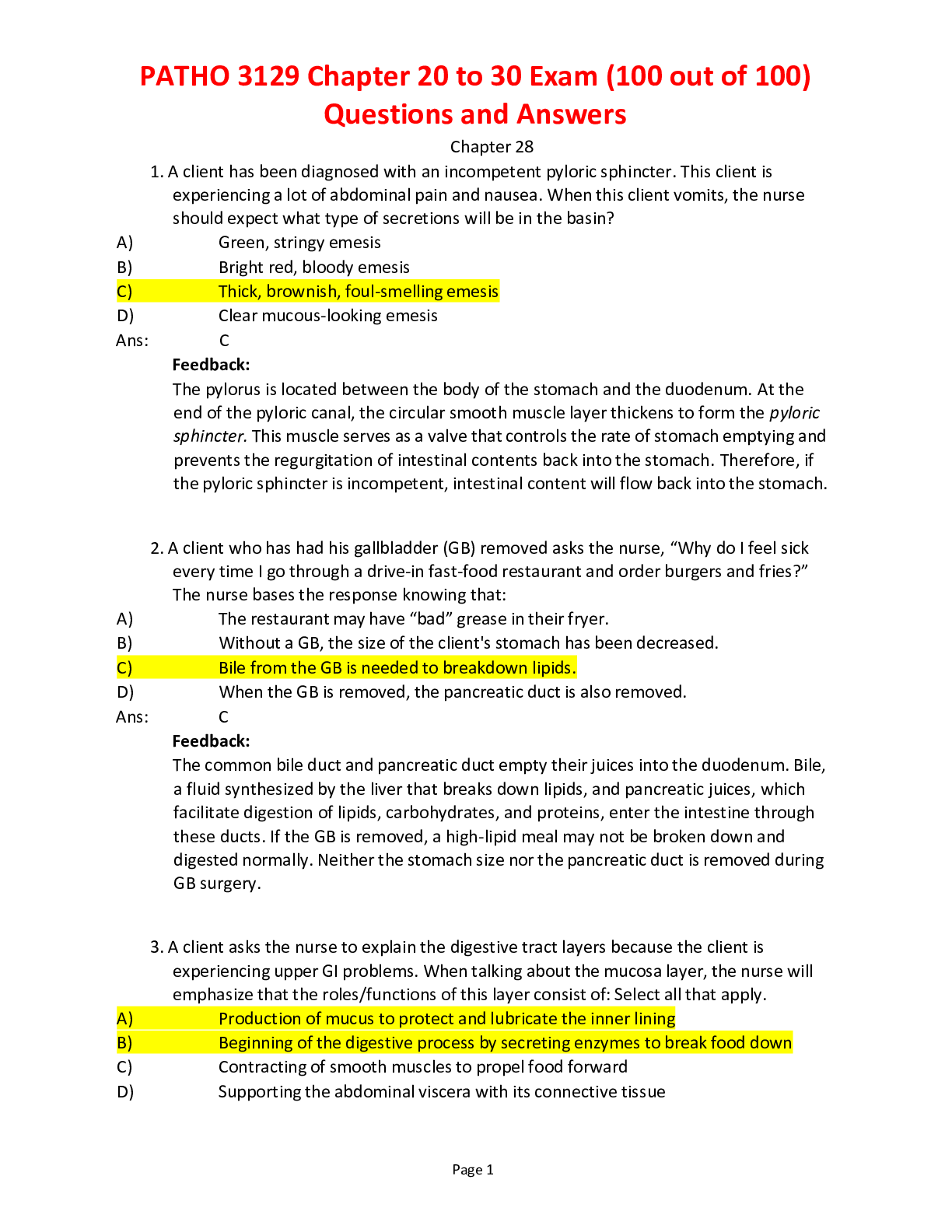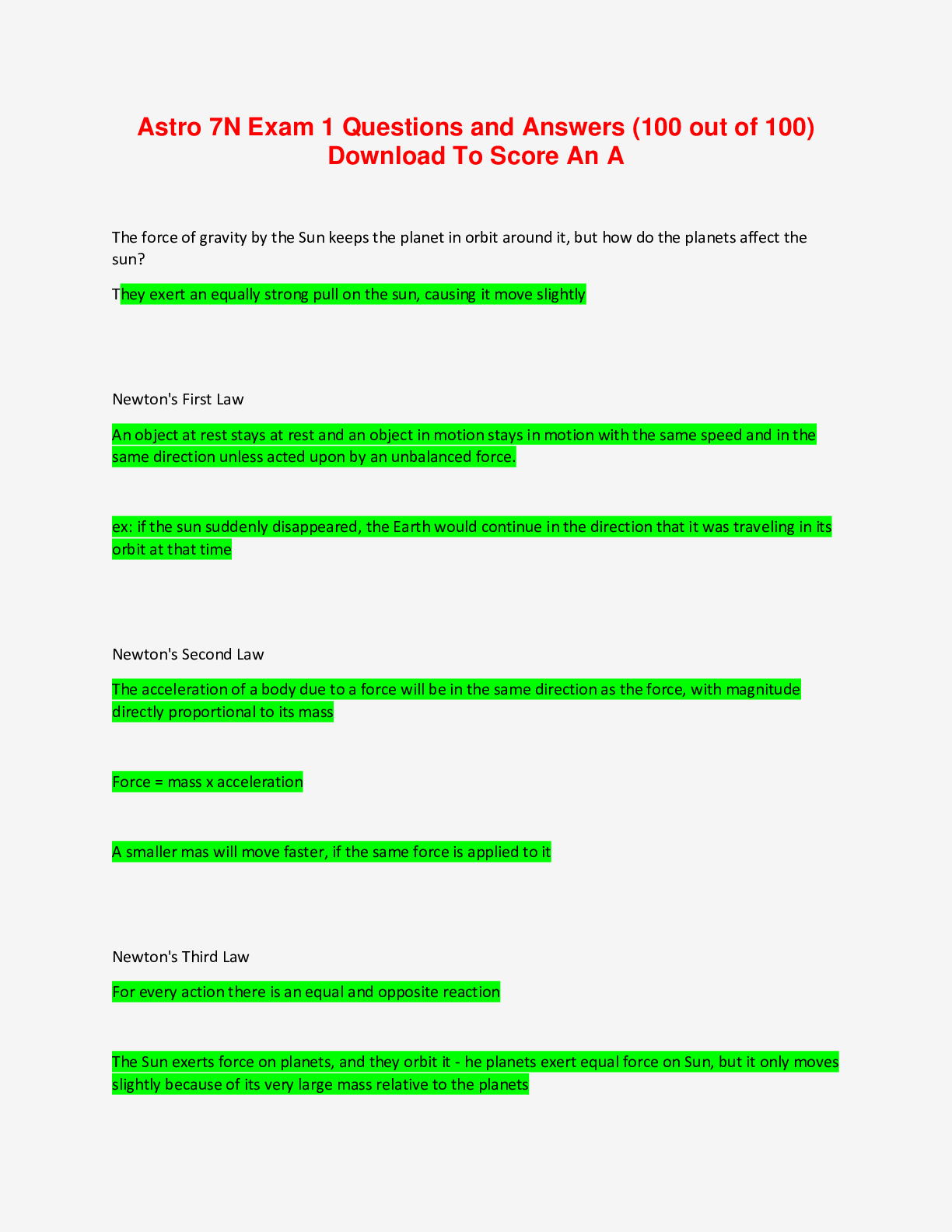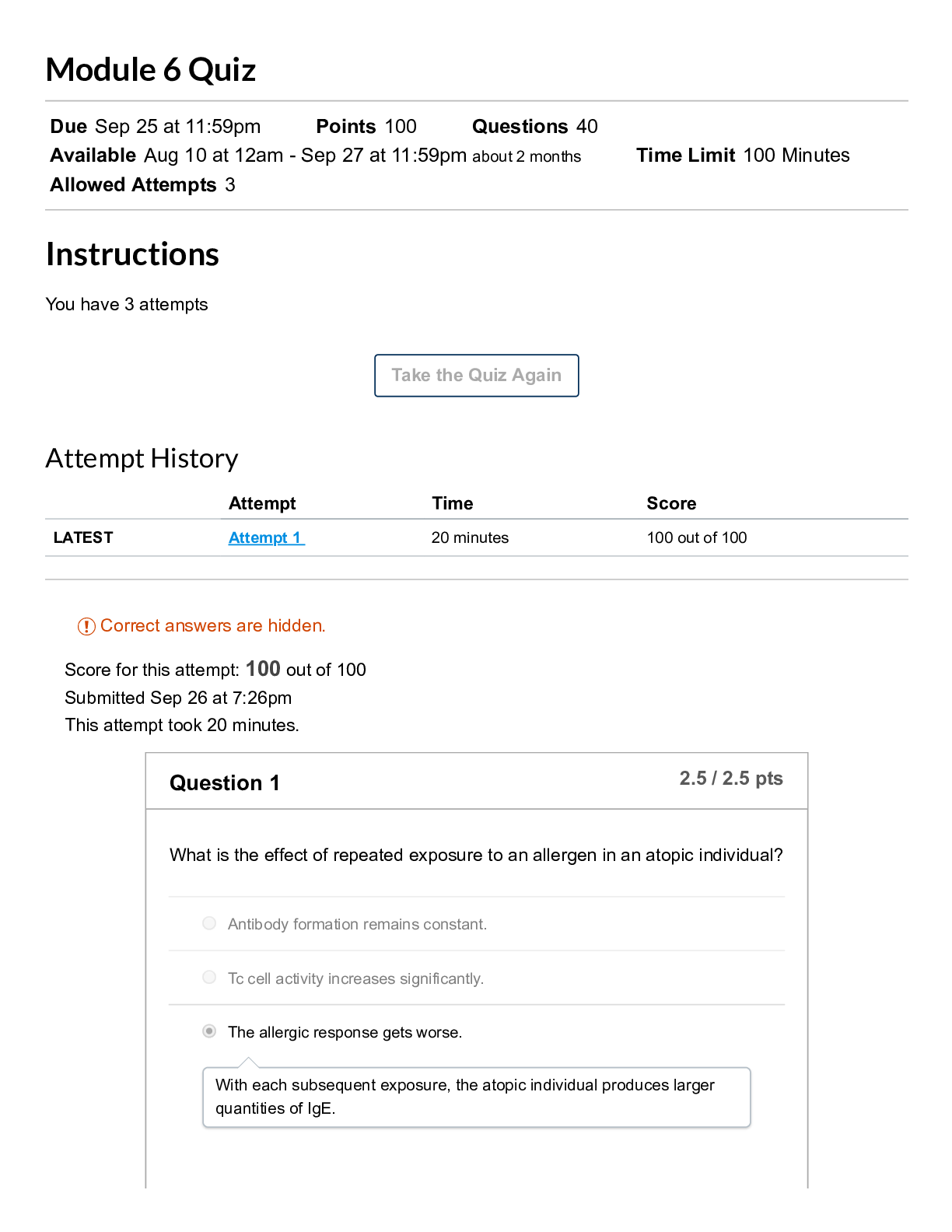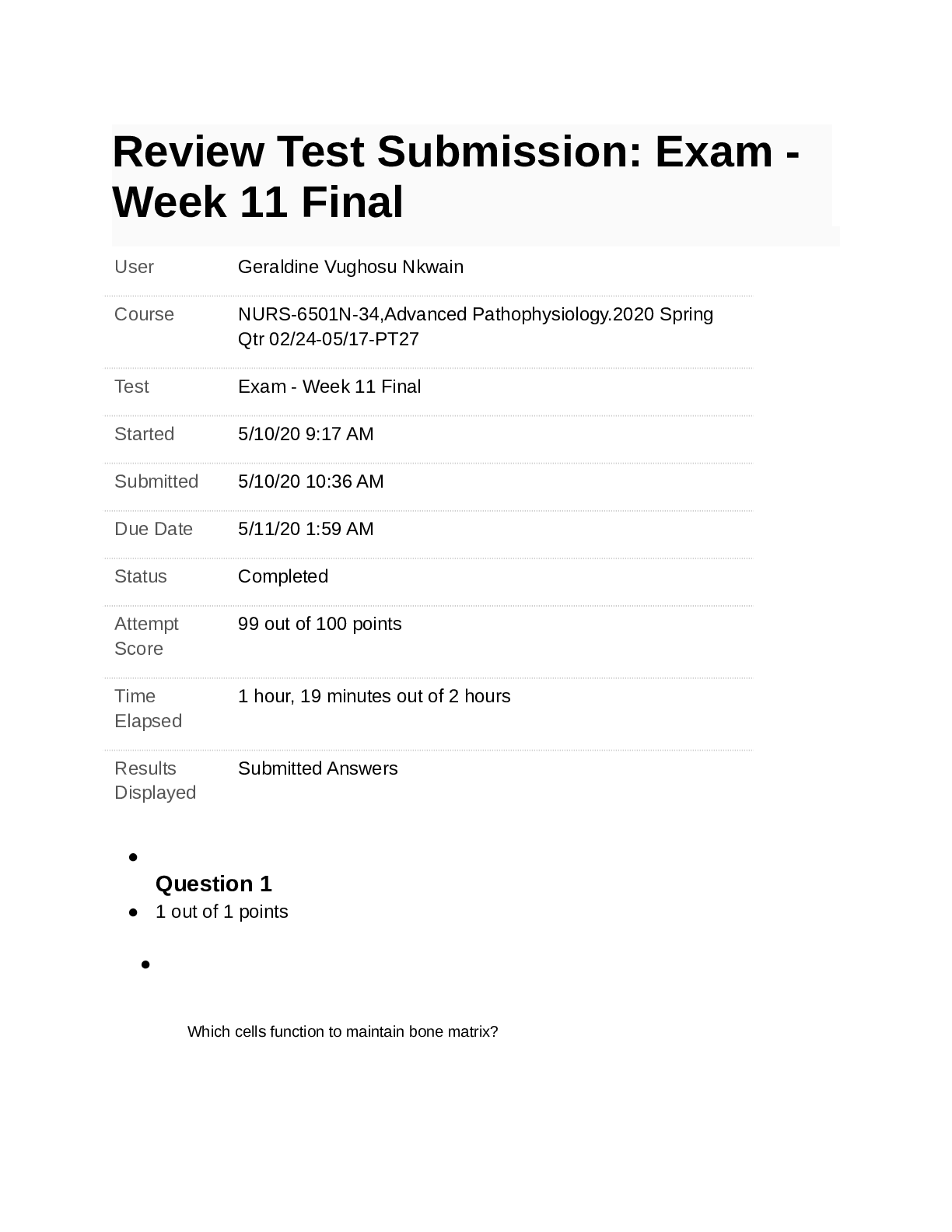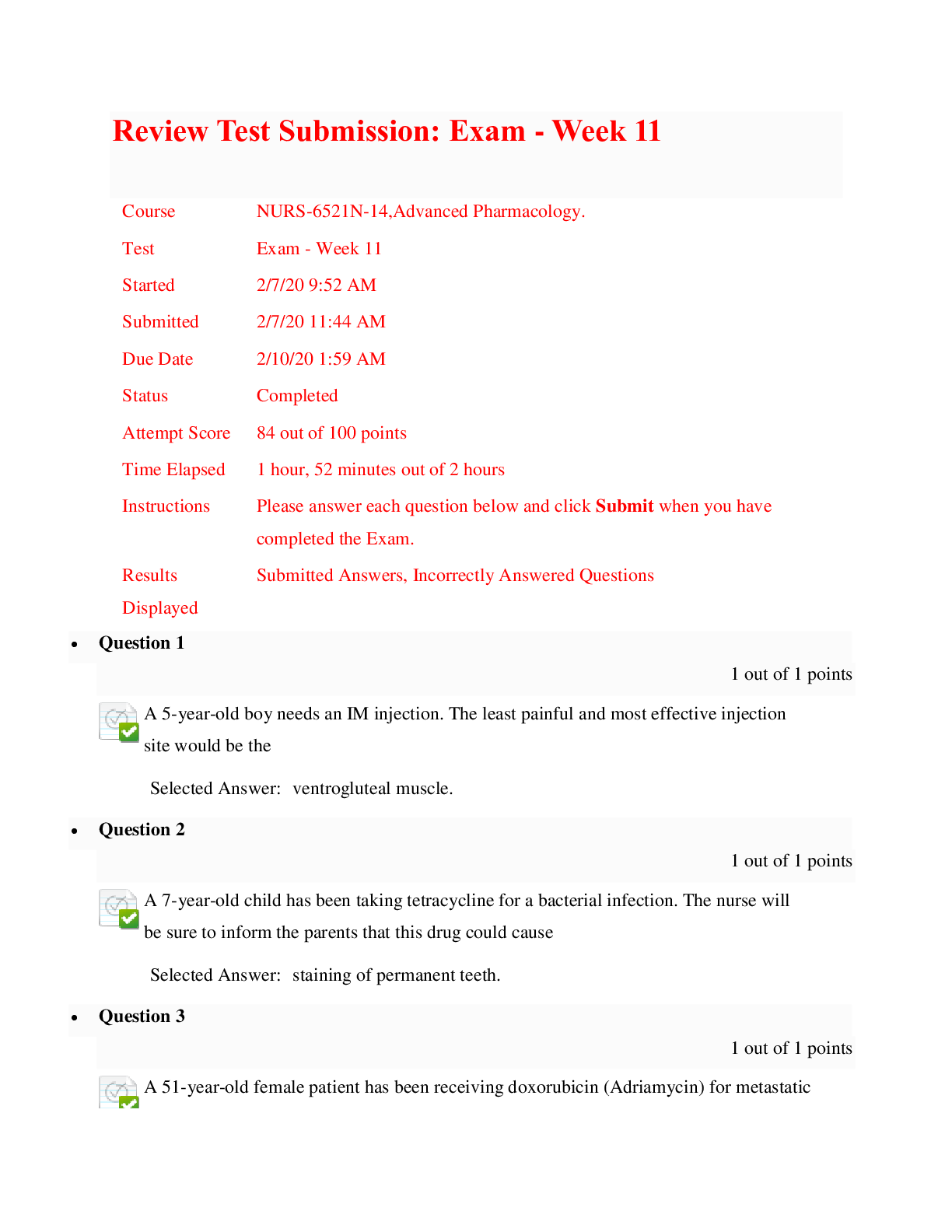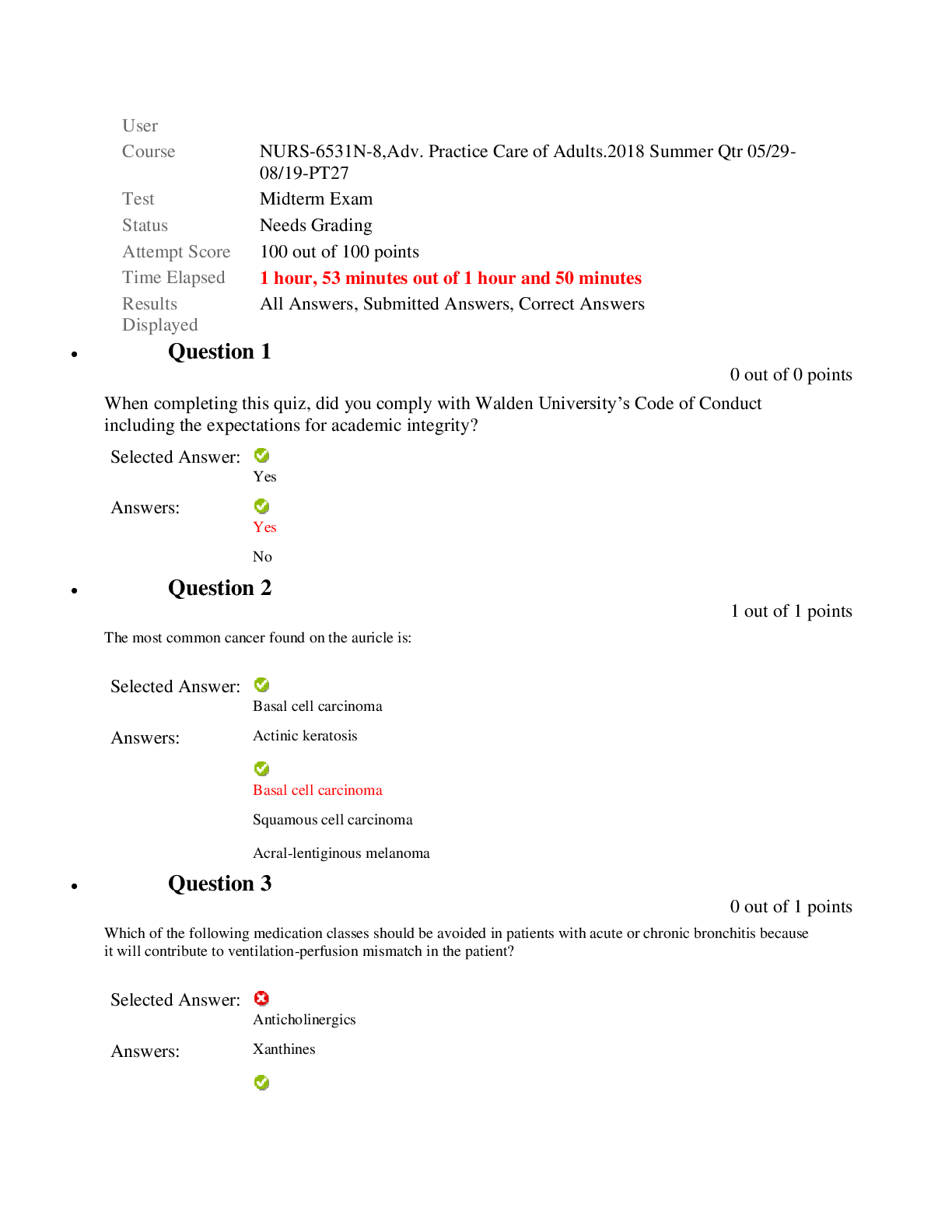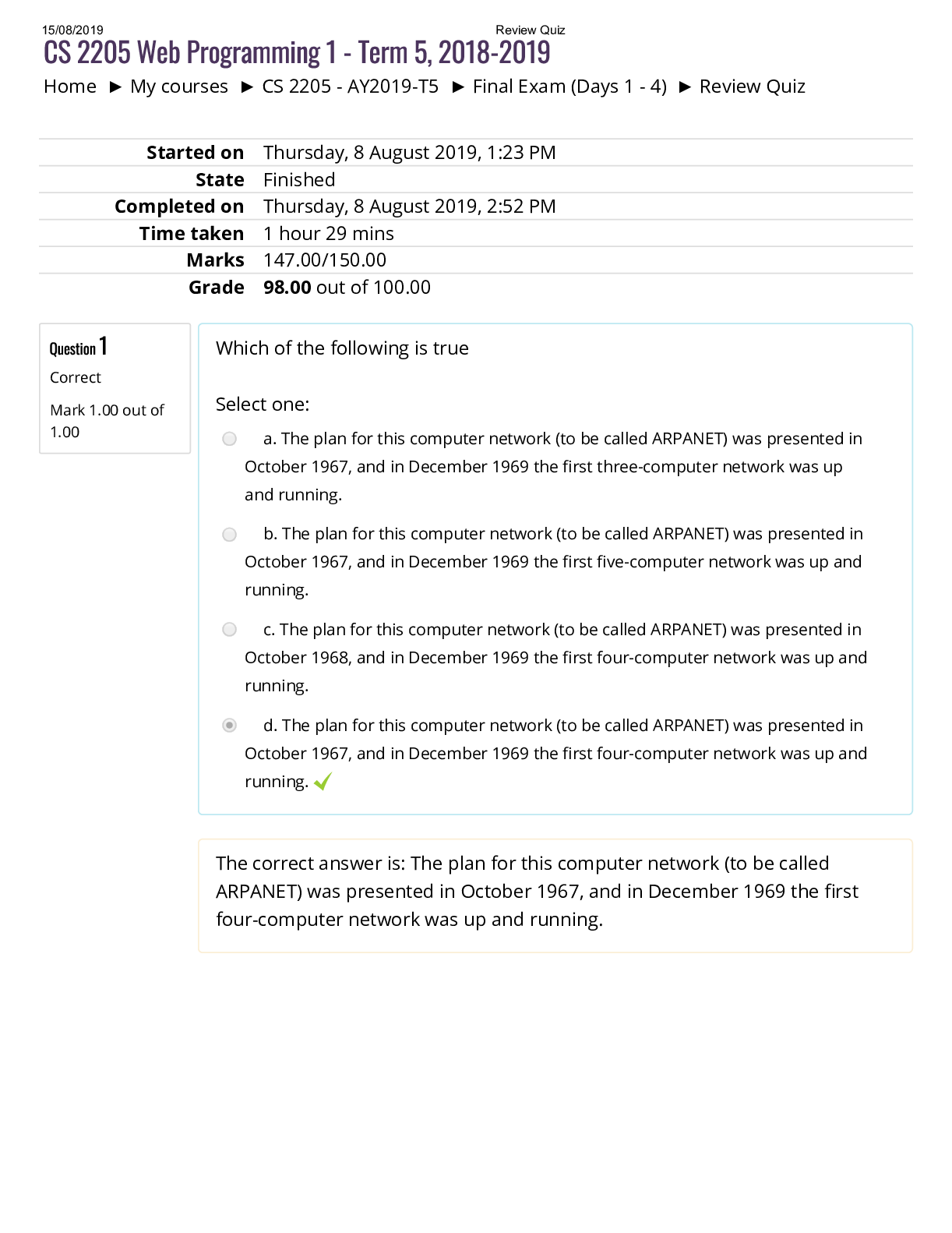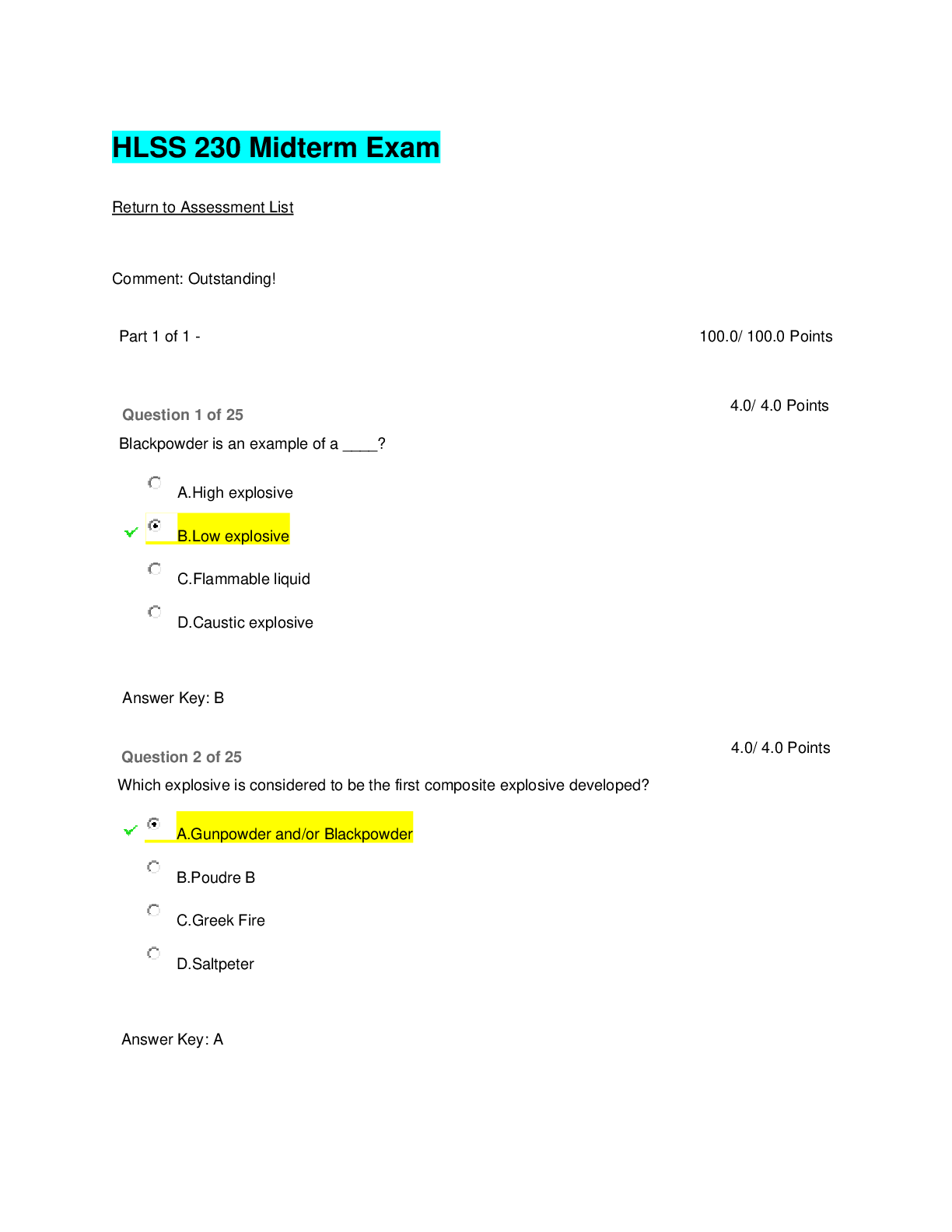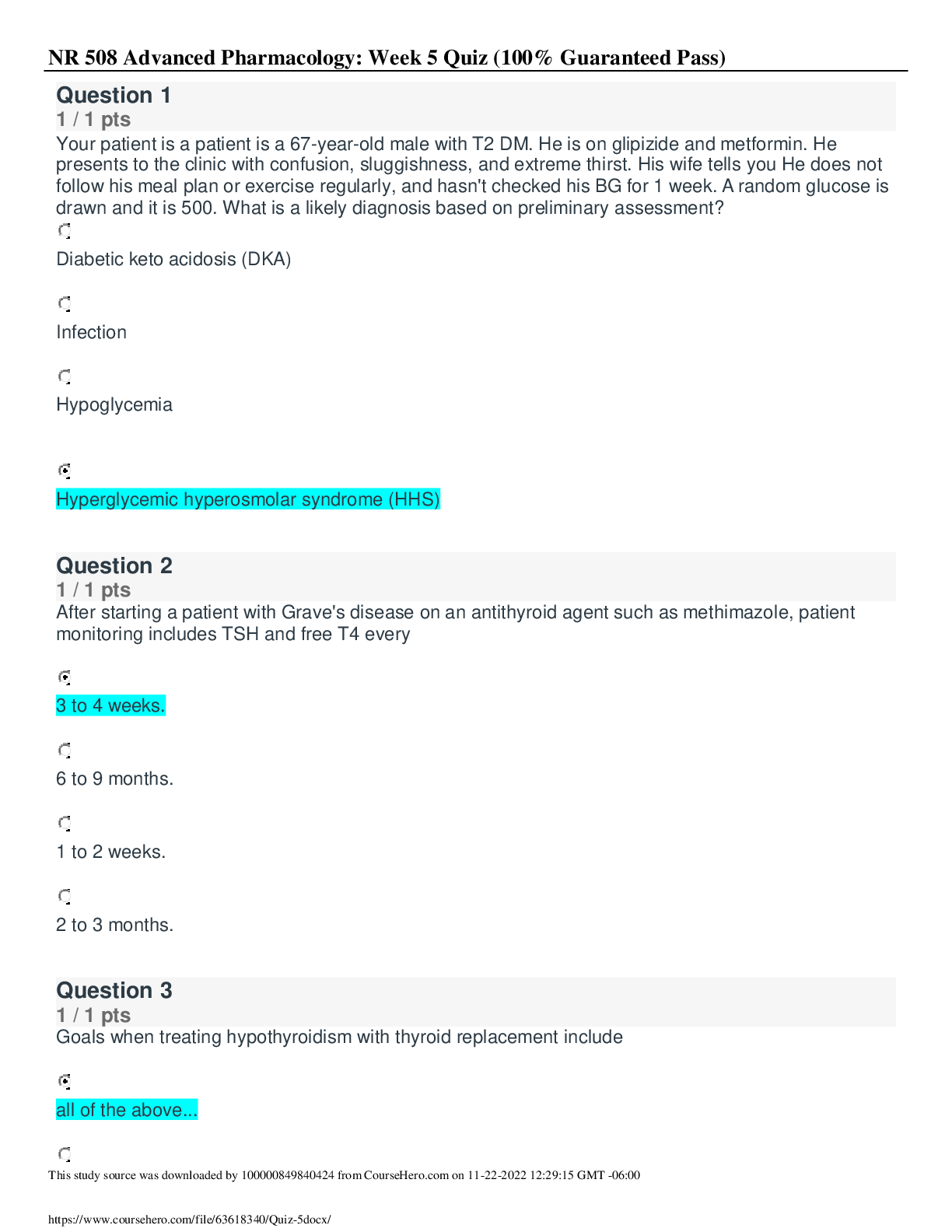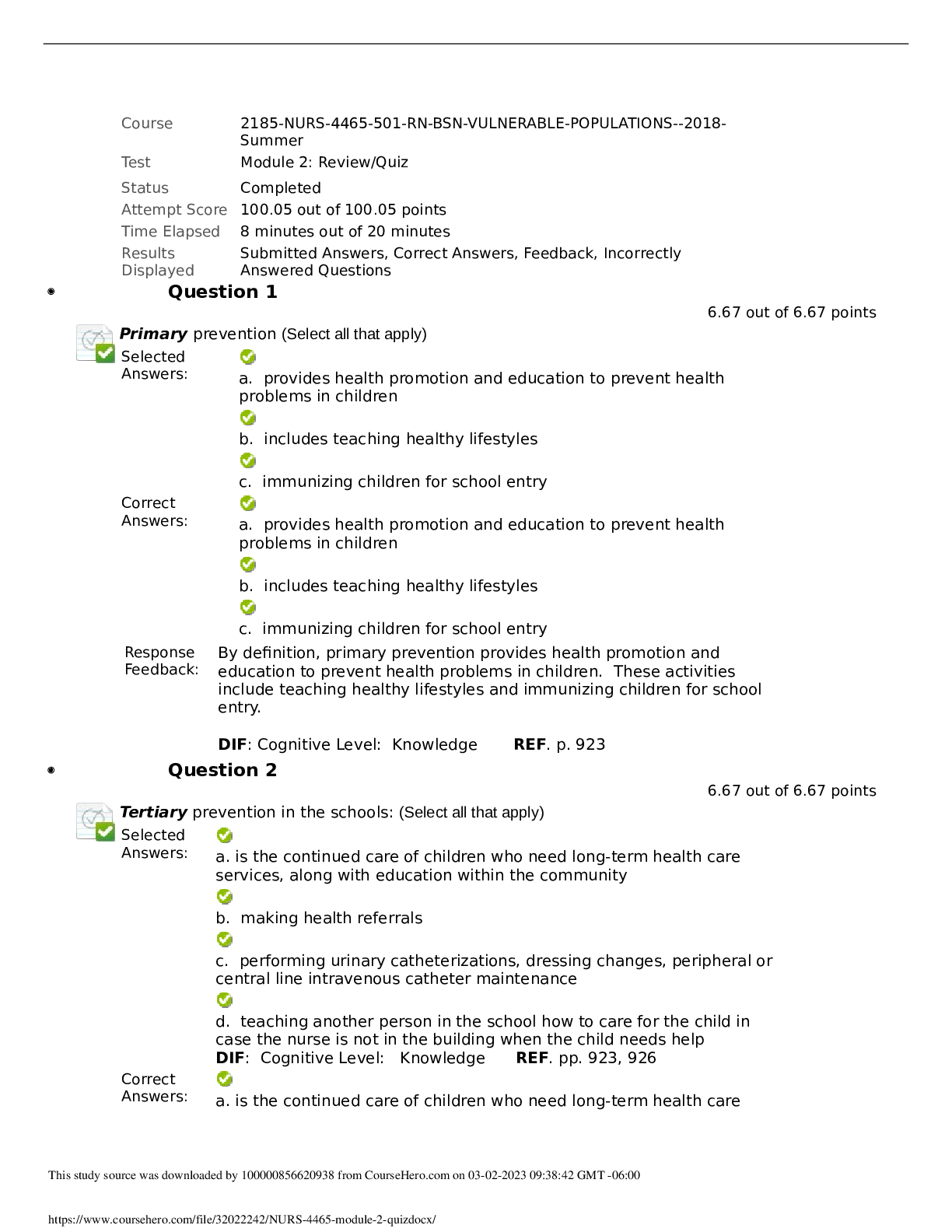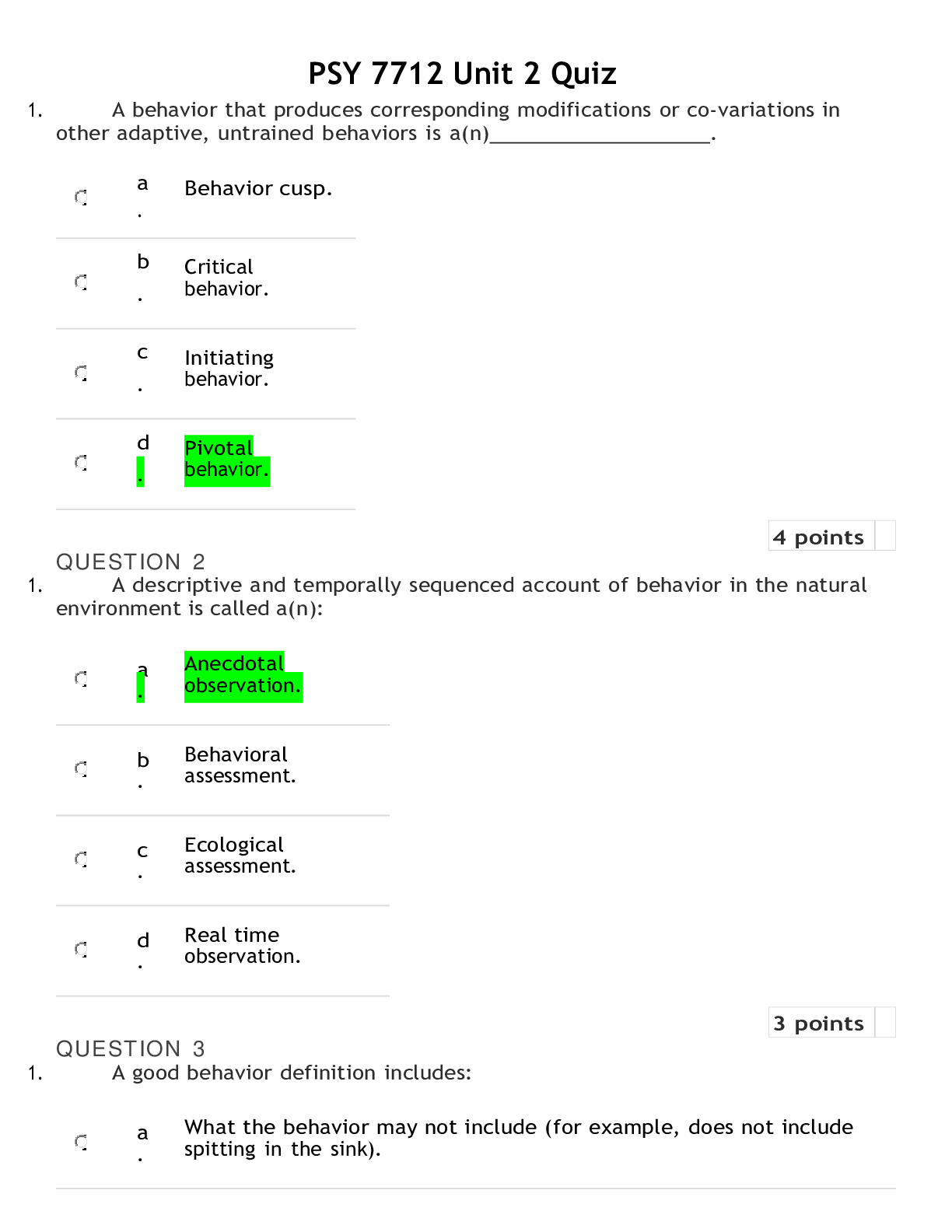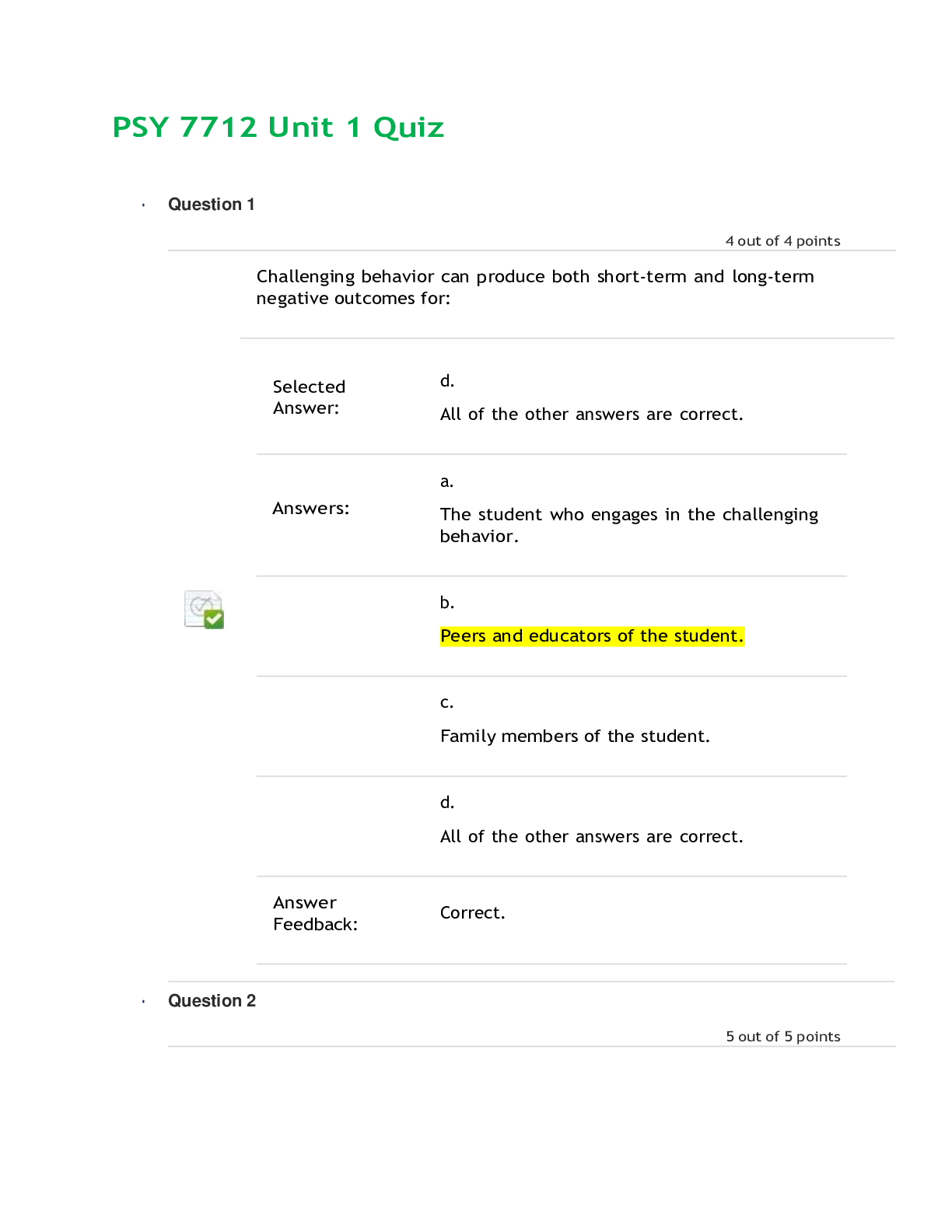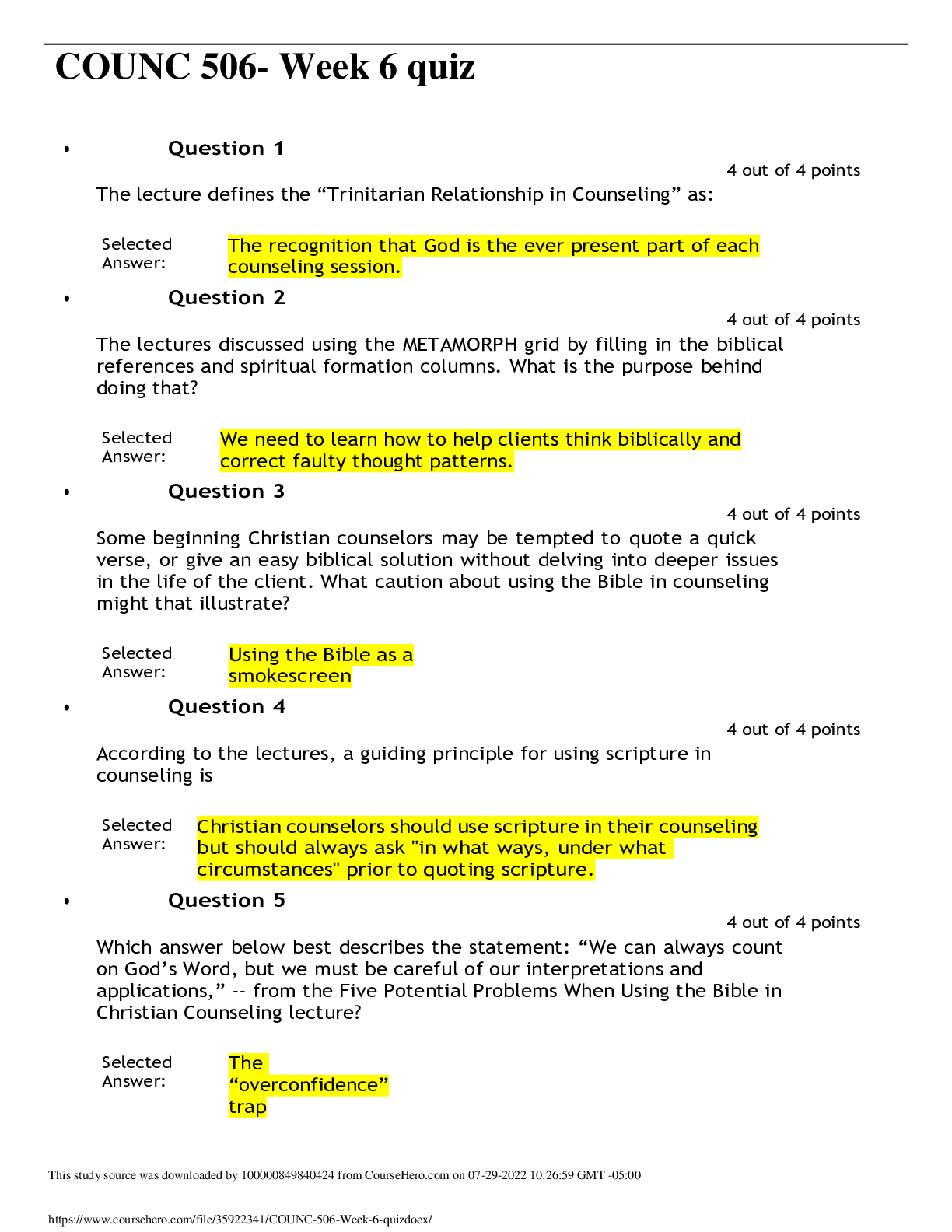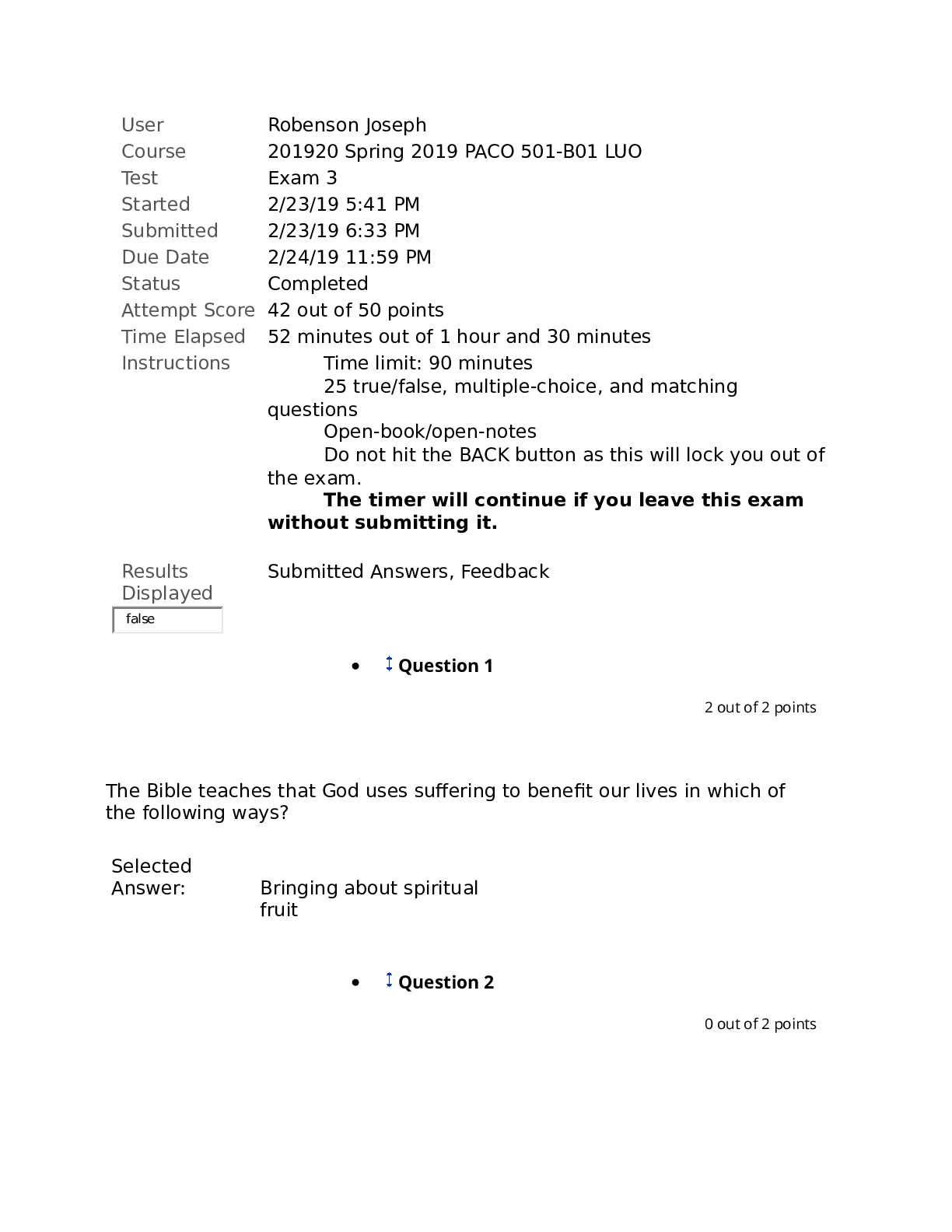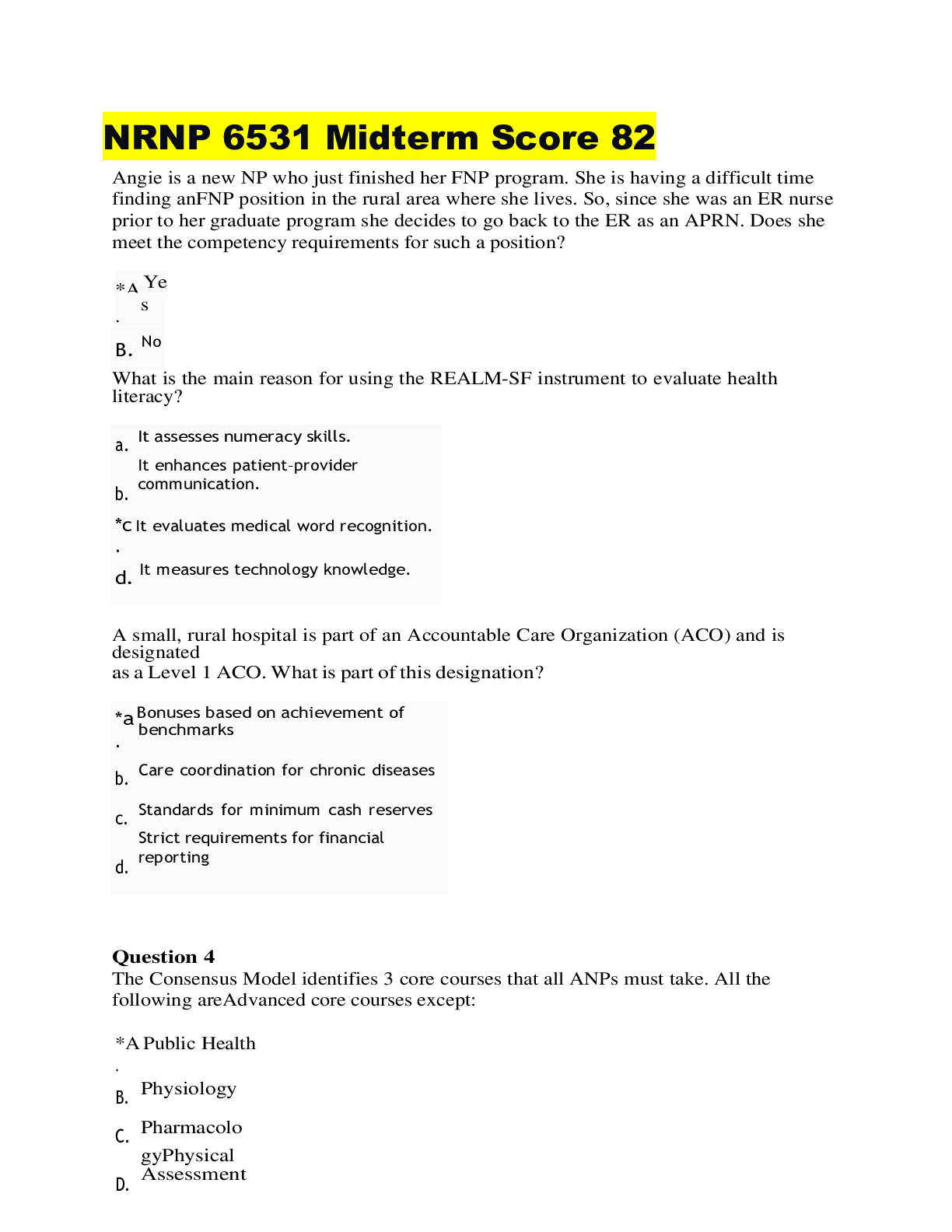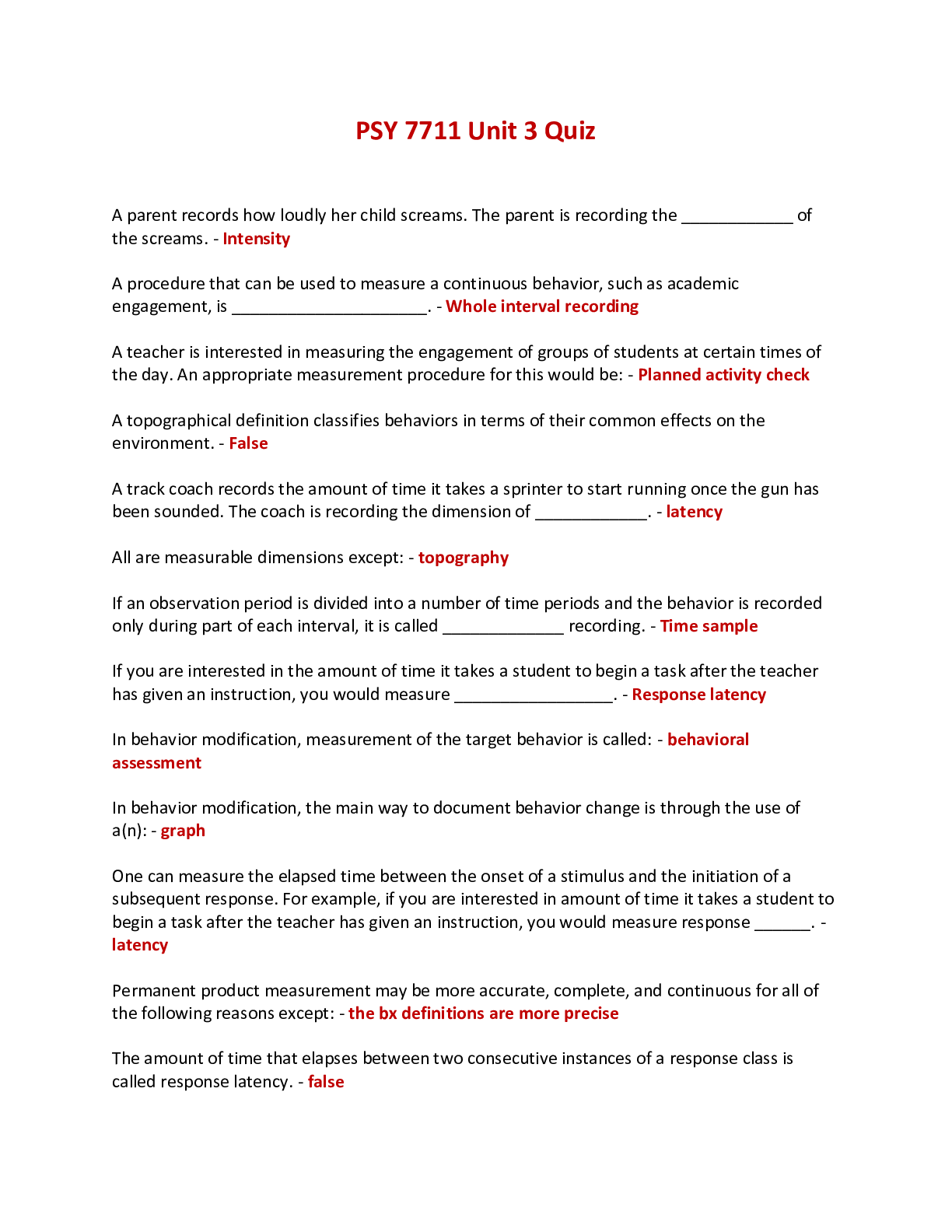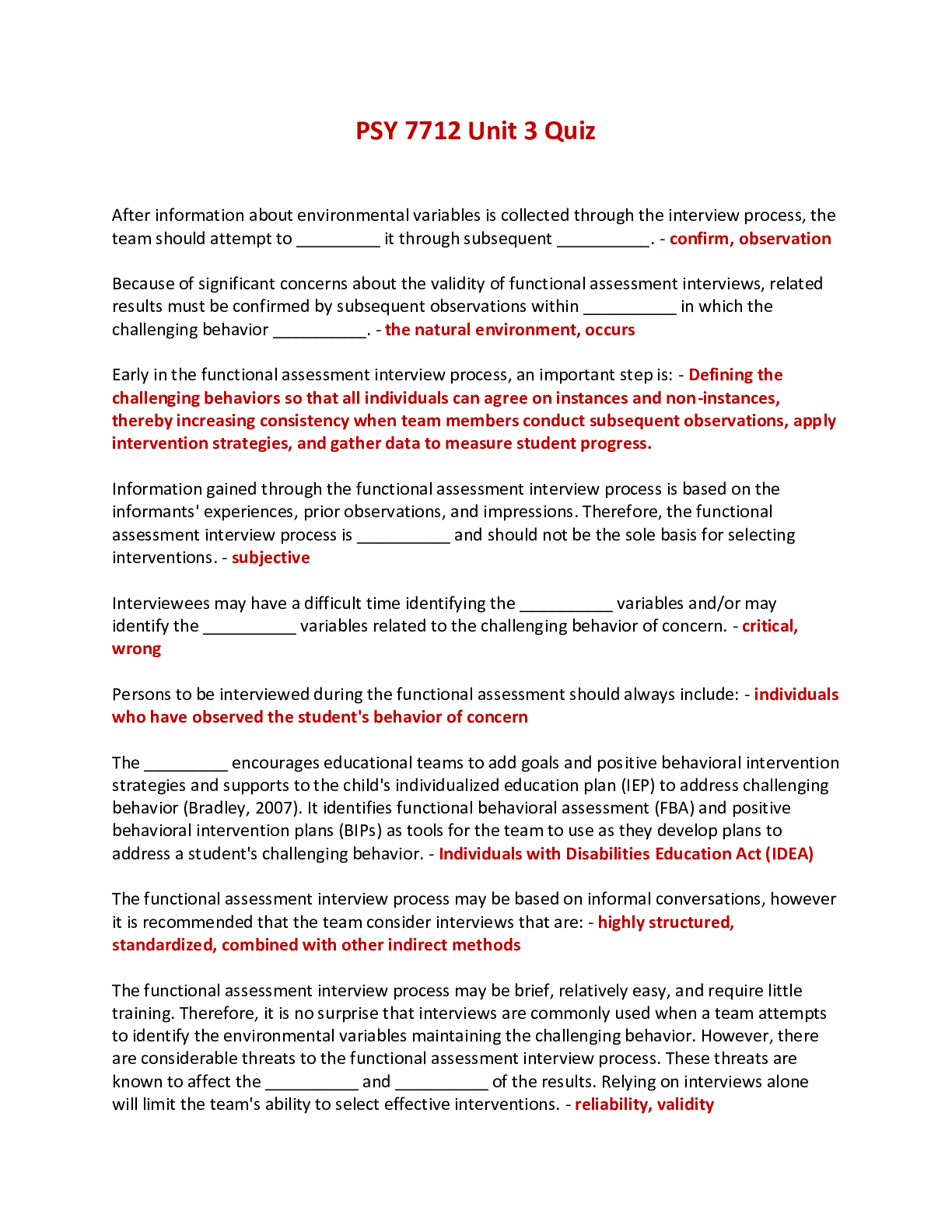Physiology > EXAM > PSY 7712 Unit 3 Quiz (LATEST UPDATE) Questions and Answers- Capella University | 100 out of 100 poin (All)
PSY 7712 Unit 3 Quiz (LATEST UPDATE) Questions and Answers- Capella University | 100 out of 100 points
Document Content and Description Below
Unit 3 Quiz 1 Started 1/11/20 5:26 PM Submitted 1/11/20 5:32 PM Due Date 2/2/20 11:59 PM Status Completed Attempt Score 100 out of 100 points Time Elapsed 6 minutes ... Results Displayed All Answers, Submitted Answers, Feedback, Incorrectly Answered Questions Question 1 5 out of 5 points After information about environmental variables is collected through the interview process, the team should attempt to it through subsequent . Selected Answer: d. Confirm, observation. b. Summarize, meetings. c. Confirm, interviews. d. Confirm, observation. Answer Feedback: Correct. 5 out of 5 points Because of significant concerns about the validity of functional assessment interviews, related results must be confirmed by subsequent observations within in which the challenging behavior . Selected Answer: b. The natural environment(s), occurs. b. The natural environment(s), occurs. c. Contrived environment(s), is provoked and punished. d. All of the above. Answer Feedback: Correct. 5 out of 5 points Early in the functional assessment interview process, an important step is: c. Selected Answer: Defining the challenging behaviors so that all individuals can agree on instances and non-instances, thereby increasing consistency when team members conduct subsequent observations, apply intervention strategies, and gather data to measure student progress. Answers: a. Hypothesizing about causes of the challenging behaviors. b. Assessing patterns of the challenging behaviors. c. Defining the challenging behaviors so that all individuals can agree on instances and non-instances, thereby increasing consistency when team members conduct subsequent observations, apply intervention strategies, and gather data to measure student progress. d. Measuring the challenging behaviors. Answer Feedback: Correct. 5 out of 5 points Information gained through the functional assessment interview process is based on the informants' experiences, prior observations, and impressions. Therefore, the functional assessment interview process is and should not be the sole basis for selecting interventions. Selected Answer: c. Subjective. Answers: a. Objective. b. Projective. c. Subjective. d. None of the other answers are correct. Answer Feedback: Correct. 5 out of 5 points Interviewees may have a difficult time identifying the variables and/or may identify the variables related to the challenging behavior of concern. Selected Answer: a. Critical, wrong. Answers: a. Critical, wrong. b. Critical, right. c. Constant, wrong. d. Constant, right. Answer Feedback: Correct. 5 out of 5 points Interviewees may provide information that could result in an invalid hypothesis about the child's challenging behavior. This may occur since: Selected Answer: d. All of the above. a. Answers: The interviewee may not recognize or objectively describe conditions when his or her own behavior is associated with the child's challenging behavior. b. The interviewee may give faulty explanations (that is, common myths, misbeliefs) for the child's challenging behavior. c. Subsequent observations may not confirm information provided by the interviewee. d. All of the above. Answer Feedback: Correct. 5 out of 5 points Persons to be interviewed during the functional assessment should always include: Selected a. Answer: Individuals who have observed the student's behavior of concern. Answers: a. Individuals who have observed the student's behavior of concern. b. Individuals who are not too familiar with the student and, therefore, can remain objective. c. Individuals responsible for disciplinary decisions. d. All of the other answers are correct. Answer Feedback: Correct. 6 out of 6 points The encourages educational teams to add goals and positive behavioral intervention strategies and supports to the child's individualized education plan (IEP) to address challenging behavior (Bradley, 2007). It identifies functional behavioral assessment (FBA) and positive behavioral intervention plans (BIPs) as tools for the team to use as they develop plans to address a student's challenging behavior. Selected Answer: d. Individuals with Disabilities Education Act (IDEA). Answers: a. Institutions Serving Persons with Disabilities Education Act (ISPDEA). b. Individuals with Learning Disabilities Education Act (ILDEA). c. Individuals with Disabilities Enforcement Act (IDEA). d. Individuals with Disabilities Education Act (IDEA). Answer Feedback: Correct. 6 out of 6 points The functional assessment and intervention model is built on a core set of assumptions concerning the development and maintenance of both appropriate and challenging behaviors. These assumptions guide the identification of the supports for challenging behavior and the interventions that are developed to address challenging behavior. Which of the following are core assumptions? Selected Answer: d. All of the above are correct. Answers: a. Challenging behavior and appropriate behavior are supported by the current environment. Behavior serves a function. b. Challenging behavior can be changed using positive interventions that address the function of behavior. c. Functional assessment should be a team-based process. d. All of the above are correct. Answer Feedback: Correct. 5 out of 5 points The functional assessment interview process may be based on informal conversations, however it is recommended that the team consider interviews that are: Selected Answer: d. All of the other answers are correct. Answers: a. Highly structured. b. Standardized. c. Combined with other indirect methods (for example, record review, questionnaires, rating scales, checklists). d. All of the other answers are correct. Answer Feedback: Correct. 5 out of 5 points The functional assessment interview process may be brief, relatively easy, and require little training. Therefore, it is no surprise that interviews are commonly used when a team attempts to identify the environmental variables maintaining the challenging behavior. However, there are considerable threats to the functional assessment interview process. These threats are known to affect the and of the results. Relying on interviews alone will limit the team's ability to select effective interventions. Selected Answer: b. Reliability, validity. Answers: a. Value, predictive coefficient. b. Reliability, validity. c. Validity ratio value, purpose. d. Impressions, hypothesis. Answer Feedback: Correct. 5 out of 5 points To gain information about the student's perspective regarding the variables that are related to the challenging behavior, it is recommended that the functional assessment team should interview the: Selected Answer: a. Student (when the student is capable of communicating his or her perspective). Answers: a. Student (when the student is capable of communicating his or her perspective). b. Guidance counselor. c. Psychologist. d. Peers, siblings, or young relatives of the student. Answer Feedback: Correct. 5 out of 5 points Various standardized interview formats can be used during a functional assessment. An extensive standardized interview protocol that requires 45–90 minutes is the: Selected Answer: b. Functional Analysis Interview (FAI). Answers: a. Observation Assessment Tool (OAT). b. Functional Analysis Interview (FAI). c. Standardized Functional Assessment (SFA). d. All of the above. Answer Feedback: Correct. 6 out of 6 points What decision by the educational team will need to be made as to whether a behavior requires functional assessment and intervention? Selected Answer: d. All of the above are correct. Answers: a. The team should decide if the student's behavior is challenging. b. The team should recognize that for the student, the challenging behavior is, in fact, very functional and effective; it produces an outcome that is desirable to the student or that meets the needs of the student. c. The team should consider the perspective of those individuals who identify the behavior as challenging. d. All of the above are correct. Answer Feedback: Correct. 5 out of 5 points Selected Answer: d. All of the other answers are correct. Answers: a. Student strengths, skills, and any previously unidentified needs. b. Environmental variables and other circumstances associated with challenging behavior. c. Environmental variables and other circumstances that are never associated with challenging behavior, plus those variables that may be associated with appropriate (and potentially replacement behaviors). d. All of the other answers are correct. Answer Feedback: Correct. 6 out of 6 points Selected Answer: c. The student's perspective. Answers: a. The teacher's perspective. b. The parent's perspective. c. The student's perspective. d. Our own perspective. Answer Feedback: Correct. 5 out of 5 points Answers: a. Informants may provide information based on very limited observations or may focus on the most recent event. b. Information is based on each informant's unique experiences and impressions. c. Informants may exaggerate the frequency of the disruptive or dangerous behavior due to the intensity or anticipated risks. d. All of the above. Answer Feedback: Correct. 6 out of 6 points Answers: a. Most behaviors are triggered, strengthened, or weakened by current environmental events. b. Behaviors that produce positive outcomes are strengthened and continue to occur. c. Behaviors that produce aversive or punishing outcomes are weakened and do not continue to occur. d. All of the above are correct. Answer Feedback: Correct. 5 out of 5 points guidelines exist stating how many individuals should be interviewed, who should be interviewed, and how often and/or across how many sessions the student's behavior subsequently should be observed. Selected Answer: b. Few. Answers: a. No. b. Few. c. Many. d. Fourteen. Answer Feedback: Correct. Thursday, March 5, 2020 4:41:05 PM CST [Show More]
Last updated: 1 year ago
Preview 1 out of 20 pages

Reviews( 0 )
Document information
Connected school, study & course
About the document
Uploaded On
Jul 22, 2022
Number of pages
20
Written in
Additional information
This document has been written for:
Uploaded
Jul 22, 2022
Downloads
0
Views
58


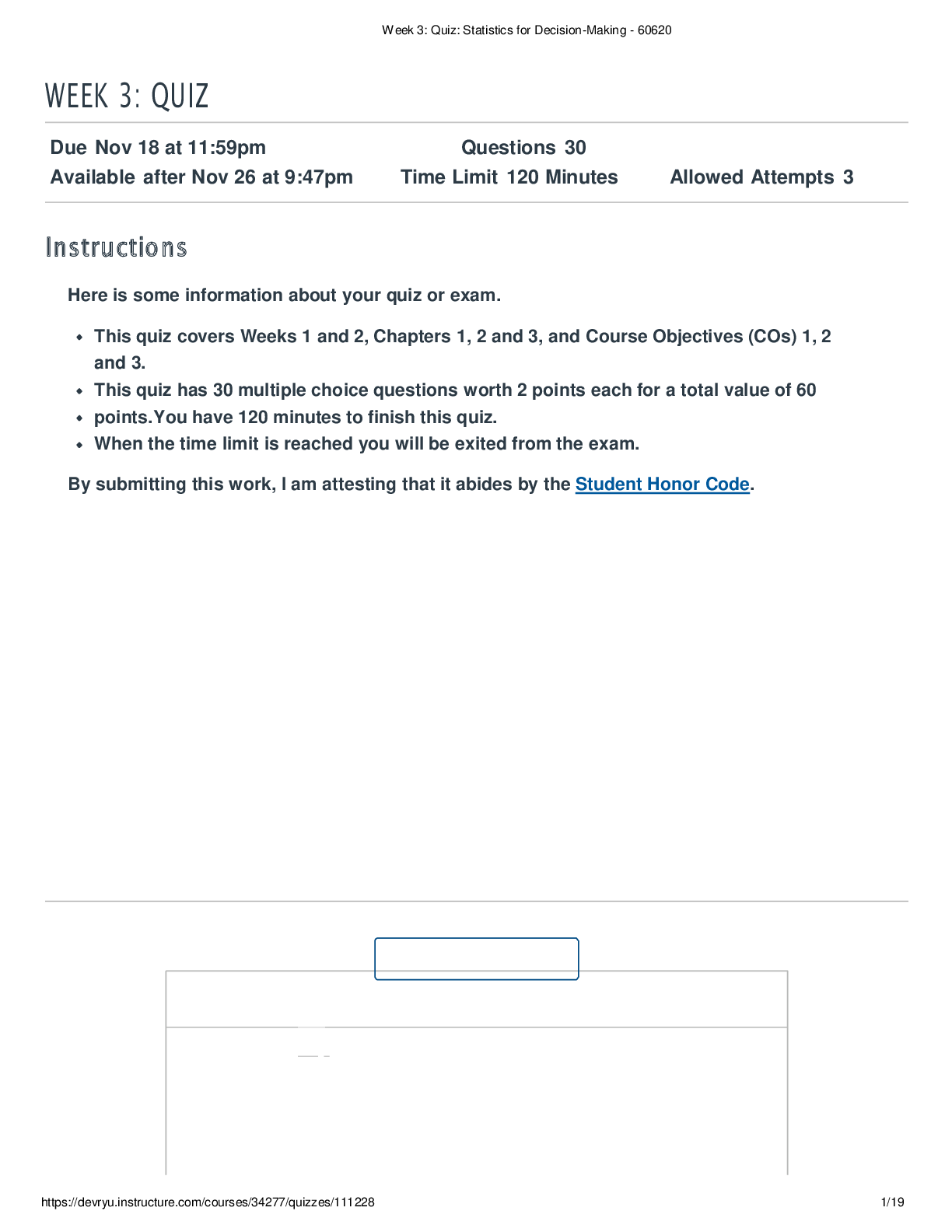
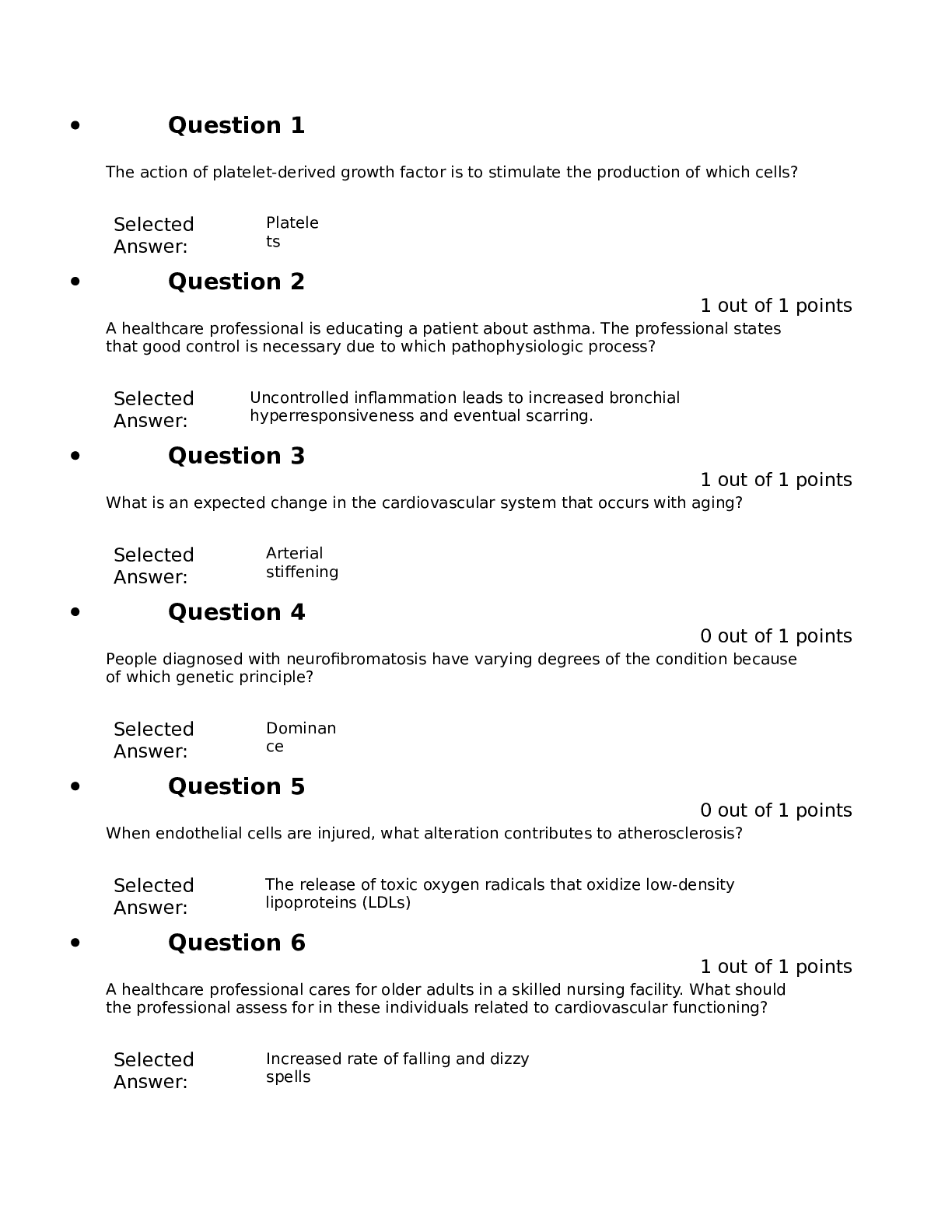
.png)
